#topic: odin's family dynamic
Text
Angel ( @the-very-nerdy-nerd ) has been subjected to many a infodump of mine, so may as well keep it consistent
The topic: the similarities and evolution of mythology into modern day religions… I might get sidetracked but here goes.
(I’m only speaking on the basis of Abrahimic religions on this part, as they’re the ones I have looked into the most. Feel free to add onto this or fact check me, most of this is running off of memory.)
Almost, if not all, mythologies have some sort of creation story. Norse has Odin using a giants body to create earth, Greek has Chaos and the goddess of Creation making the earth, and Egyptian has Amun-Ra who created Shu and Tefnut and all three created the chaos of the universe, crying humans into existence and then making earth for said humans to reside on. I think the reason for these explanations of events was because they (to put it simply, because this is a whole other ramble for another time) were curious and the stories helped to satiate that. Humans instinctively want to understand, to learn, so there were probably always these sorts of stories.
The main thing all of these have in common is that there was some form of chaos before there was Earth, whether it is called such or not. However, in Christianity, God existed before anything as He created everything, making the Earth before anything else. If it weren’t for the fact that God is supposedly all-good (again, another rant for another time, contradictions are fun), one could look at all the evidence and claim that God Himself is the chaos that underpinned the creation of the universe according to Christianity, but as chaos is all-encompassing (both good and evil, and not consistently one or the other), I’m reluctant to think that that fits right.
Another similarity between the mythologies I’m most familiar with is that they all have some form of hierarchy even between the deities, with some seen as the rulers over the rest. Odin and Frigg, Zeus and Hera, and Amun-Ra. This plays a key point in the dynamics for how the entirety of their respective mythologies play out, and they also seem to represent the key values that were feared and respected for their regions.
Odin was known as the All-Father, he was a god of tricksters and sacrificed his eye in order to get more knowledge. Frigg was known as the All-Mother, and was a fertility goddess. The main things they, as a pair, represent are: wisdom, family, growth.
Zeus was known as the last born of his siblings, and the only one to avoid being eaten by their father, freeing his siblings and ruling Olympus as its king, he was the god of lightning and storms. Hera was known as the goddess of oaths, and marriage, being married to Zeus herself, she was ruthless to those who broke their oaths, and the offspring that tended to come from Zeus breaking his oath to her. The main things these two represent are: the power of a warrior, and the importance of oaths.
Amun-Ra has the characteristics of a solar, creation and fertility god, all of which held extremely high value in Egyptian society. (Is it obvious that I don’t know this mythos in as much detail?)
But God is the only god of His religion, although the angels, saints and Jesus get prayers too. He can’t be disobeyed by the angels as only humans have free will, so that cuts out the ‘ruling over them’ part, as He wouldn’t have much to rule over if not for the humans. He is accredited as the all-powerful God, however an archangel that defected and led a rebellion against Him was able to taint the first humans, and He didn’t stop it, so how all-powerful can He really be?
2 notes
·
View notes
Text

╰┈➤ VI TALKS ABOUT THOR/MCU / @requiend / no longer accepting !
🔥 allow me to enable, with any topic of your choosing !

||. "Thor: The Dark World" (Thor 2) was a financial success, well-received by everyone who isn't part of the toxic Loki!Fandom and is absolute peak Thor content and I can prove it.
I've done extensive research on the critical and box office success of the Thor franchise and in this research I discovered the following:
Financial Success:
On average, each film of the THOR franchise grossed about 3.75x the production budget of each film, altogether.
Thor: Love and Thunder and Thor (2011) both made ~3.0x their production budget
Thor: The Dark World did 4.3x better
Thor: Ragnarok only did 4.7
This actually means that, adjusting this scale for inflation between 2011-2017, AND for Thor's popularity after his first debut, Thor actually makes consistent money. Thor: Ragnarok is actually on average with the rest of Thor's films, INCLUDING Thor (2011), so despite all of the YouTube critics lording it as the best thing ever because Tai.ka Wa.i.ti.ti wrote it, the fact of the matter is Gagnarok is just... 'a good Thor Movie' just the same as ALL the rest of them. (Which is actually, technically, bad, because it threw away everything about him and we saw how well that turned out in Endgame's cinematography/framing and L+T. Nobody appreciates it.)
Critically Well-Received:
If you chronologically search for reviews of Thor: The Dark World and actually read most reviews, while Dark World wasn't a box office smashing success, it was generally well received by the public (until the loki fans ruined it.), and any critiques that were given were valid ones, or directed towards the film editors since the THOR films usually have a lot of ground to cover, and not a lot of time.
you can read some reviews here:
SlashFilms / Oct 22nd, 2013
Never Been Better / Nov 8th, 2013
RoboHeartBeat / Nov 8th, 2013
Slice of SciFi / Nov 8th, 2013
AIPT Comics / Nov 8th, 2013
Ajaydsouza / Nov 12th, 2013
AustinChronicle / Nov 8th, 2013
The Providence Journal / Nov 7th, 2013
People saying that it's "the worst Thor Film of all time" or that it was 'boring' are generally people who, I kid you not, wanted Tom Hiddleston to write the next Thor Movie, only went to watch the film for Loki/because Loki was in it, and otherwise complained about him "not having a lot of screen time" despite being a secondary character on par with Jane Foster. (Which, I understand that Loki is popular, and I think he's lovely and that Tom is a wonderful actor and we're absolutely blessed to have him and Chris Hemsworth in their respective roles, especially together – but Loki isn't the main character and he isn't supposed to be.)
Peak Thor Content
In this singular movie alone we get:
Absolutely the best character design for Thor out of all his appearances even up til now.
A sleek armor design
Chris' REAL HAIR being used instead of a wig (it's so pretty!)
even a better, more flowing cape design that was a real cape!! Not CGI like in Thor: Gagnarok!
The Entire Poncho Look
EXTREMELY complex and interesting dynamics with his entire family (Jane is included as part of the family.)
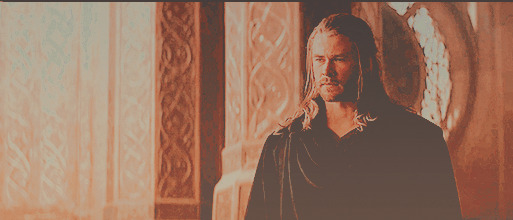
With Odin, he's subservient to a worrying degree, but still willing to rebel against him, even if that could mean banishment or being public enemy no.1 whilst his father is deranged.
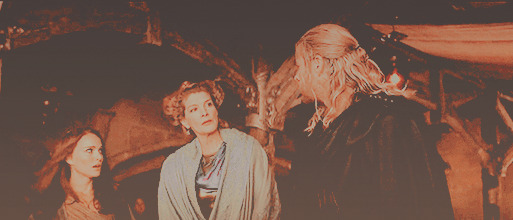
Frigga as always is generally complicated, but they get along well enough, and she accepts Jane into the family immediately, and Thor thinks highly of her, even if he doesn't know her so well.
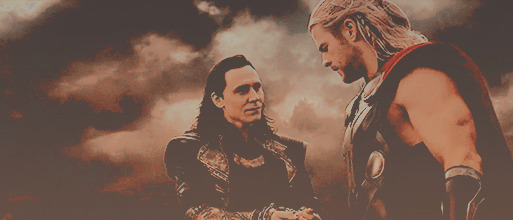
Loki's primarily in the Asgardian dungeons, but despite this, because he is in the back of Thor's mind even when Loki is away, the audience is CONSTANTLY thinking about Loki too. His presence is felt everywhere, and when the two brothers finally reunite on screen, it's after a year of separation and festering betrayal of their bond. Loki's redemption moment is in this film. ("Trust my rage") and it's probably one of the BEST brodinson moments of the entire series by far. Loki also spends most of his time outside of prison just trying to get Thor to break out of his apathy, which is nice.

And Jane and Thor are positively sweet! Their chemistry together is off the charts and so utterly wholesome. He perks up almost instantly when she finds her way back into his life, and I love that she actually helps him defeat the main villain, Malekith, with her science inventions. (2011-2015 jane foster is peak jane foster). I also think it's worth noting that the tone for their relationship is pretty clearly set in this film. He's a protector, she follows his lead, but he relies on her to keep him in check and assist him whenever she is able. They're great rulers together!
He has a subtle, sassy humour that oozes out of him in every scene where it's applicable for him to be a bit funny. Some of my favorites include:
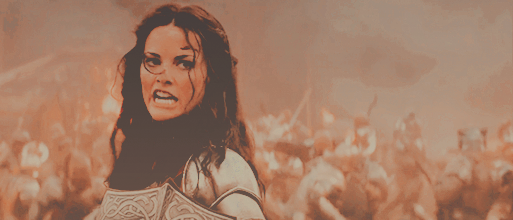
Sif: I had this under control!

Thor: (smiling) Is that why everything is on fire?

Thor: (GETS BOMB-RUSHED BY A BRUTE IMMEDIATELY)
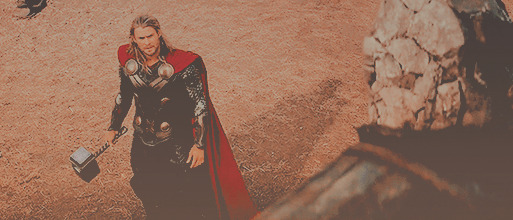
Thor: Hello.
Brute: (ROARS IN HIS FACE)
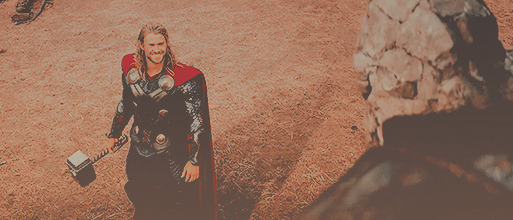
Thor: I accept your surrender.
Maurader Crowd: (CHEERS AND JEERS)
Thor: (laughs silently. DESTROYS THE BRUTE IN ONE SWING.)
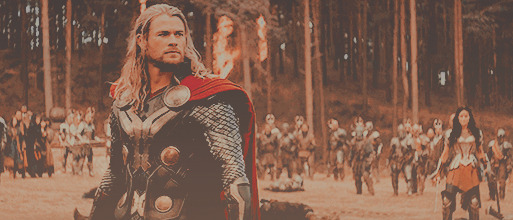
Thor:
Thor:
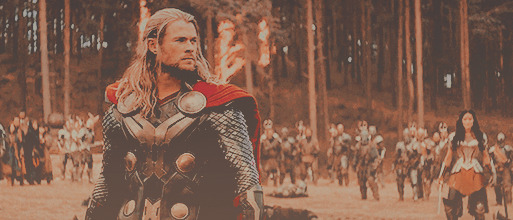
Thor: Anyone else?
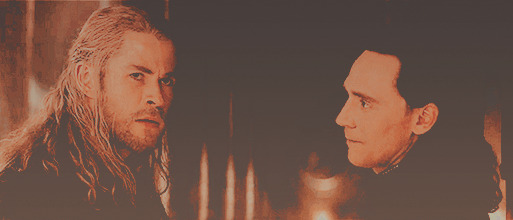
Loki: At least furnish me with a weapon. My daggers. Something!

Thor: (begrudgingly looks at him.)
Loki: (smiles)

Thor: (acquiesces)
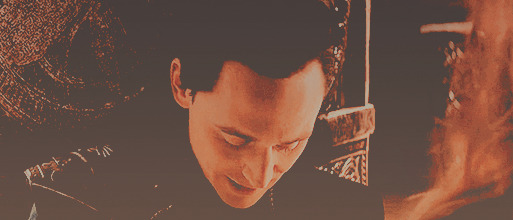
Loki: At last! Common sense—....
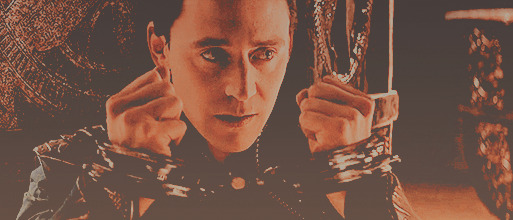
literally this entire face

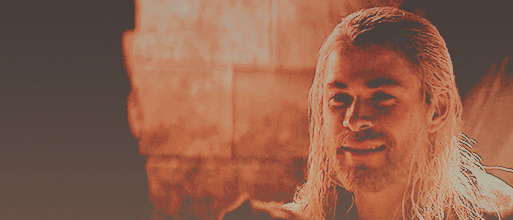
Thor: And I thought you liked tricks. (wiggles his whole body happily as he walks away laughing)
and also the ENTIRE space ship scene between him and loki. Not gonna cap that one past this but:

L: No don't hit the buttons press them. Gently.
T: I AM ""presSING THem gENtLy"" it's nOT WORKING >:T
L: I think you missed a column.
T: Shut up.
L: Congratulations! You just decapitated your grandfather.
L: Maybe I should try flying. :T I'm clearly the better pilot.
T: Really? Well, between the two of us, which one can actually fly?
I COULD GO ON but i'll leave it here...for now..
#( ooc . ) — stories that leap from the page .#( answered . ) — black feathers fall to a raven's call .#( meta . ) — son of cosmos . lightning flows through thy veins .#requiend#(thor 2 is the best thor film don't @ me i could talk abt this film all day i've watched it 5 times in the past 2 months)
2 notes
·
View notes
Text
T'Challa's a big man in a suit of vibranium with heart-shaped powers. But take that away and what is he? As it turns out, someone who will still beat your ass.
Black Panther makes fantastic use of its limited screentime. It has a higher burden on its shoulders than previous entries in the MCU. It needs to build up and develop a political conflict embedded in an entirely fictional nation, never before introduced.
The film has what I would typically expect to see as a sequel plot. You spend the first film introducing the characters and setting, getting the audience accustomed to what they can reasonably expect, and then you shake things up in the second.
You don't jump straight into disrupting the status quo of Wakanda before the audience can get comfortable with what that status quo is. You don't blow up Asgard and kill Odin in the first Thor film. You're going too fast. It's going to come off rushed.
But credit to the filmmakers, they pulled it off. And the way they did it is through careful and efficient use of the scenes they had to work with.
M'Baku's challenge for the throne does so much. It provides quick identification and exposition on the five tribes who make up Wakanda. It shows us the loyalty and faith in the ruling family held by four of the tribes, as well as introducing the political conflict with the Jabari. It introduces M'Baku and gives us a cool fight demonstrating M'Baku's brutality and conservatism contrasted against T'Challa's merciful heart. And it sneakily provides the means by which T'Challa's reign will ultimately be upset.
This one fight lays so much groundwork for the political dynamics at play in Wakanda. The most important thing to establish in the movie, when those political dynamics are going to be the main topic of its subject matter.
8 notes
·
View notes
Text
You ever think about the fact that we've only seen Loki try to initiate non-violent physical contact like, twice and both times, he got dropped like a hot potato the second Thor showed up? Because I do 😢
#to add to the heartbreak#one of those two times doesn't even work#because it's in the dungeons#and it's almost like he momentarily forgets that frigga isn't really there#idk it just feels so symbolic of how he's always trying to connect with people#but no one can ever be bothered to try connecting with him#loki deserved better#i will never be over loki#loki meta#loki#mcu#topic: odin's family dynamic#frigga's b+ parenting
140 notes
·
View notes
Text
It’s been years since I last read Runelight so I don’t know how well this would work, but hear me out.
A Runelight AU where instead of knocking Loki out and leaving him for the other gods to find and assume he started the apocalyse (again), Maddy convinces him to come along on her quest to find her twin sister.
Instead of just throwing a rune at him (arguable in self defense) Maddy could’ve reminded him she’s kicked his butt before and that it would probably be in his best interest not to stick around when the other gods realised she’d basically started the apocalypse by waking up Sleipnir
Or she could have just taken Loki with her after she knocked him, it wouldn’t be the first time that’s happened
Then we could have had more wacky adventures with the dynamic duo featuring snarky banter, an annoying travel companion in the form of a constantly complaining god of wildfire, and generally more weird hijinks
Unfortunately this means there’s no travelling circus of gods across the nine worlds but I’m sure Ethel and Perth/Odin could just figure another plan out
No getting permanently magically handcuffed to crazy ex-wives this time around either
While we’re on the topic of fixing things, how about Maddy finds Maggie sooner and gets her out of there before she can get pregnant with the Whisperer’s next host
Adam Scattergood gets his butt handed to him in 17 different ways
Seeing Maggie doesn’t get tricked into the wedding ceremony that triggers, umm, the rapture/ the Whisperer gaining a zombie army, the evil is stopped, the final battle goes well, yada yada, and nobody goes missing
Asgard gets rebuilt and Loki actually gets his own hall this time because he doesn’t need to spend the time everyone else is rebuilding it trying (unsuccessfully) to remove Sigyn’s bindrune
Maggie is reunited with her actual family instead of being stuck in the middle worlds with a (possessed?) newborn surrounded by people who are scared of her
Anyway, anyone is welcome to run with this idea because I don’t know if/when I’ll ever find the time to re-read Runelight and actually write this
6 notes
·
View notes
Note
lol the loki/robert comparasions, i can kind of see too esp the family dynamic jack =odin, andy=thor and robert =loki
Okay? I could pull the same comparison to other characters as well. Labelled as the bad guy but deep inside he has all these emotions, has a difficult relationship with his father, he was never given the credit he deserved, somehow he always ends up with the bad choices and dodgy deals that lends him in more trouble? I could say it also fits Ben from EastEnders. I think we can all find links between different stuff we like if we're searching for it. No doubt it works for this specific topic. I just choose not to compare them? If that makes sense.
2 notes
·
View notes
Note
(sorry this is long) I'm creating a fantasy matriarchal society that's a combination of like America post WW2 and like the amazons/valkyries crossed with magical girls. I could use some help figuring out the gender dynamics, since part of my goal is to use the swap to highlight some inequalities that still exist in our gender expectations today by flipping them. I'm trying to figure out if it's better to have the men be primary caregivers (1/?)
since there’s no reason to assume that the gender that gives birth has to be the caregivers) or if I should go the “matriarchal society would value childrearing above other jobs” route. Some thoughts I had: Women are the main magic-users in society (magical girl/amazons blessed directly by the god who rules the city with power)and that perhaps all young women are expected to go through military service of some sort before becoming matrons, politicians and doctors. (2/?)
Maybe women are associated with Life and Death and “important duties” that revolve around them, including duties regarding both killing and saving lives. So healing, leading armies, fighting, hunting, childbirth (possibly care?) and politics are feminine jobs, while “lesser duties” that revolve more around menial labor are relegated to men (manual labor, maintenance, ‘uneducated’ jobs, support jobs like scribe and secretary, cooking, cleaning, perhaps some jobs like fashion design or art). (3/?)
Do you think this is a good balance? What are some other ways I could divide gender roles? The world situation is a magical land with about early 20th century level tech (trains and private schools and like phones/radios).Also, what is the best way to objectify men in this society? I was thinking of making it so men are seen as useless/only for the purpose of providing sexual pleasure and siring children to women. (4/?)
They don’t’ actually create children or take the ‘important jobs’ (the poor dears just don’t have the brains for it, they’re too simple and direct, men don’t have the emotional maturity to handle serious issues, they lack empathy, they only want sex anyway so it’s not like you need to worry about their emotional needs, etc). I’d love some suggestions on how a society like this might work or if there are other ways to divide the gender roles, (5/?)
as well as some ways men might experience objectification in society. How would fashion be different, and how would this society put pressure on men to look or act in certain ways (and women as well). Any suggestions? Thanks, and sorry for the long question(6/?)
Mod Miri Note: If you have a question that requires multiple asks, please use the google form! That way there’s no risk of parts of the question being lost.
Tex: “Do you think this is a good balance?” No, I do not. I disagree with the notion that a group of people ought to be objectified, neglected, abused, pigeon-holed, or otherwise mistreated under the guise of inversion as a way to tout a certain prescription of thought. I think this methodology perpetuates stereotypes, and with stereotypes come all the -isms that are used as excuses to treat people poorly just because they’re different from the originating group.
I’m going to be radical and say “none of the above”. There’s a few reasons for my answer, but aside from the brief overview in the previous paragraph, let me go through and try responding to all of your points in a more precise manner.
Let’s start with American culture post WWII - and I’m going to assume that, because of this choice, you’re working from an American perspective. This is important! But I’ll handle that detail in a bit.
Post-WWII culture is heavily influenced by WWII culture. For women, this meant enlistment in the military, as well as filling the gaps in the domestic labor force left by men being shipped off (History.com, The Atlantic). Their service in the military - quite often voluntary - was as critical and crucial as their domestic work (Wikipedia 1, Wikipedia 2, Wikipedia 3). They usually received lower pay than men, true (though interestingly the women in the UK were often treated better; Striking Women), though governments of the time admitted that without women the war effort would have crumpled.
Rosie the Riveter is a popular piece of propaganda (where it was also considered patriotic for women to join the workforce and military service; National Women’s History Museum), but don’t let that dissuade you from thinking that women were not recognized for other types of work during the war. Many women in the US were recognized for their military service (USO), and other women’s histories endure today - Lyudmila Pavlichenko (Wikipedia), Vitka Kempner (Wikipedia), and Virginia Hall (Wikipedia). I’m going to toss in the official synopsis of Queen Elizabeth II’s involvement in her own military to round things out (The Royal Family), complete with a picture of her in uniform (Wikipedia).
Many women after the war went back to strictly domestic duties, and I think that parallels their wartime efforts - both situations are of the “all hands on deck” type, but the play of gender roles here means that the duties of a functioning society are divvied up by different functional spheres - and make no mistake, men and women relied on each other equally as much to cover the gaps, despite the sexism inherent in modern Western society. The difference between war and non-war time cultures was that the latter wasn’t necessarily cultivated by patriotism that could unite the different “factions”. The Oxford Research Encyclopedia of American History gives a thorough examination of this topic.
The following era - typified by the birth of the Baby Boomer generation - saw a marked increase in economic prosperity (Wikipedia). With that came increased social mobility for women (Citation 1), usually catalyzed by the actions of their fathers (Citation 2). This may typically be achieved by consistent, conscientious public policy formation (Citation 3). In short, many cultures - if they haven’t already - are realizing that it’s good for business to let women control how they participate in society and the flow of money.
In the US, this was precipitated by the boom of social development (American History; archived version). Aside from the Truman administration negotiating price fixing to prevent inflation, a significant factor was the passing of the Servicemen’s Readjustment Act of 1944 (AKA the G.I. Bill). This primarily benefited the Greatest Generation, though other pertinent legislation by the 79th Congress benefited the Silent Generation onwards: the Fair Deal, Revenue Act of 1948, Taft-Hartley Act, Employment Act of 1946, National School Lunch Act, and Hobbs Act.
It’s debatable how well this impacted long-term economic development, considering the almost immediate rise of McCarthyism in the US in 1947, which was heavily intertwined with the Truman Doctrine that precipitated the Cold War. The results of the war, at least economically, were… mixed (Wikipedia 1, Wikipedia 2). I have no doubt that this impacted the social mobility of women in all affected countries - which is all of them, but I’m sure hairs could be split on this if you wish.
Now that we’ve got that out of the way, let’s tackle the Amazons.
The modern, popular interpretation (that is slow to be shaken by archaeological evidence) is mostly mythological (Wikipedia). While some ideas are thrown in the way of a Minoan Crete ancestry to the myth, there are more similarities drawn to the Scythian and Samartian cultures on the Eurasian Steppe (CNET). It’s possible that instead of the equally-extreme pole end of the gender dichotomy that is patriarchy-matriarchy, the Scythians just scandalized the Athenians with a comparatively more fluid society (Smithsonian Magazine).
As for Valkyries… there’s been a revival of them in pop culture, probably as a net-casting to see what’s out there aside from Amazons. TVTropes covers the many, many ways media utilizes them as a trope, to varying degrees of mythological and cultural accuracy. As they state, valkyries are a form of psychopomp, as they decide who among the battlefield’s dead will go to Valhalla (ruled by Odin) or Fólkvangr (ruled by Freya). Freya seems to have assumed the “type” (as opposed to characteristics salient to a particular individual) of a valkyrie, as the female counterpart the warrior archetype. To wit, Freya herself may be a type (Wikipedia).
Here’s where the issue gets thorny - modern popular understanding of valkyries, and by extension Scandinavian women, is skewed through the modern lens.
@fjorn-the-skald has a lovely series called Viking History: Post-by-Post, or An Informal Crash Course & A Historical Guide to the Vikings, that typically focuses on medieval Iceland. In his post “Lesson 13.c - Women in the Viking Age, Part III: Were Women “Vikings”?”, discusses the particular penchant of modern times to romanticize and/or skew history to their own biases - in this instance, how medieval Icelandic women functioned in their culture, as well as how valkyrie myths play into this.
The TL;DR of that is: “viking” women were a societal anomaly, the battlefield was a male domain (and they were expected to die on it), a woman’s prowess of the domestic sphere was highly respected to a level often equivalent to men, and the domestic sphere was the sphere of commerce. Scandinavian culture prized strong women, just as they prized strong men, and their culture rested upon the concept of different genders having their own distinct, complementary, and equal domains.
Fjörn builds upon this history in an ask about gender roles outside the usual dichotomy of male-female. Valkyries, and shield-maidens, may be classed as a third gender in medieval Scandinavian culture, because women were temporarily occupying the male role in their society. While valkyries are of divine origin, shield-maidens are not, though they seem to have taken on a supernatural bent by performing feminine qualities while living in the male sphere (something that they can literally wear, by the donning of their armor).
That probably comes across as distasteful to, especially, a modern American perspective, but many ancient cultures are like that. There’s a footnote on that ask about links to a contemporary perspective of same-sex relationships, as well, to round out that talking point.
With those historical and mythological details discussed, let’s move on to magical girls.
Interestingly, the genre and trope derive from the American TV show Bewitched (Nippon.com). Its evolution reflected Japan’s changing tone about female sexuality, focusing on girls. Magical Girl doesn’t seem to be intended to attract the male gaze in a sexual light - and in fact was generated as a form of female empowerment by by way of growing up (TVTropes), but it seems to happen anyways (TVTropes).
Magical girls, as a genre, originated in the 1960s - the archetypical Sailor Moon encompasses not only magical girls, but also the kawaii aesthetic. Kawaii, incidentally, followed after the magical girl trope, and plays upon women performing as girls in society.
As magical girls are intended for young girls, a demographic known as shōjo, it is considered a subgenre of the target audience. Please note that shōnen'ai (Fanlore) and yaoi (Fanlore) are also subgenres of shōjo.
For some context, the adult female target audience is known as josei, the young adult men is known as shōnen, and adult male audience is known as seinen. Many manga and anime are often misattributed to the wrong category, so it helps to know which is which, and why.
Kumiko Saito argues (through an unfortunately paywalled article that I’m more than willing to disseminate to those without JSTOR access) that magical girls reinforce gender stereotypes as well as fetishize young female bodies. She argues this point more eloquently than I can, so I’ll be quoting a few sections below.
Page 148 (7 of 23 on the PDF):
The 1960s “witch” housewife theme waned quickly in the United States, but various cultural symbolisms of magic smoothly translated into the Japanese climate, leading to Japans four-decade-long obsession with the magical girl. Bewitched incorporated the concept of magic as female power to be renounced after marriage, thereby providing “a discursive site in which feminism (as female power) and femininity has been negotiated” (Moseley 2002, 403) in the dawning of Americas feminist era. Japans magical girls represented a similar impasse of fitting into female domesticity, continued to fascinate Japanese society, and came to define the magical girl genre. In direct contrast to the American heroines Samantha and Jeannie, however, whose strife arose from the antagonism between magic (as power) and the traditional gender role as wife or fiancée, the magical girls dilemma usually lies between female adulthood and the juvenile female stage prior to marriage, called shõjo. In other words, the magical girl narratives often revolve around the magical freedom of adolescence prior to the gendered stage of marriage and motherhood, suggesting the difficulty of imagining elements of power and defiance beyond the point of marriage. In fact, these programs were broadcast exactly when the rate of love-based marriage started to surpass that of miai (arranged marriage),4 which implies that the magical girl anime, founded on the strict ideological division between shõjo and wife/mother, may have been an anxious reaction to the emergent phase of romance.
Page 150 (9 of 23 on the PDF):
The combination of magical empowerment and shõjo-ness framed by the doomed nature of transient girlhood naturally created ambivalent, messages in Akko-chan as well. In the societal milieu in which Japan was undergoing the politically turbulent era of Marxist student movements at the largest scale in the postwar era, Akko-chan’s super- human ability to transform into anyone (or anything) is quite revolutionary, implying a sense of women’s liberation. Despite this potential, her metamorphic ability never threatens gender models, as she typically dreams of becoming a princess, a bride, or a female teacher she respects. The use of magic is also largely limited to humanitarian community services in town. Akko-chan’s symbolic task throughout the series focuses on how to steer her power to serve her friends and family, leading to the final episode in which she relinquishes magic to save her father. Akko-chan embraces the cross-generic mismatch between the radical idea of empowering a girl with superhuman ability and the hahamono [mother genre] sentimentalism idealizing women’s self-sacrifice. All in all, the new setting adopted in this series, that a mediocre girl accidentally gains magic, became a useful mechanism for the underlying theme that the heroine is foredoomed to say farewell to magic in the end. This rhetorical device transforms latent power of the amorphous girl into the reappreciation of traditional gender norms by equating magic with shõjo-hood to be given up at a certain stage.
Saito discusses the thematic shifts in the magical girl subgenre in the 1980s to a more sexualized view, and the according rise of both an older audience and otaku fans, the latter of whom, she clarifies, make a habit of recontextualizing canon to categorize characters into stereotypes that are stripped of the majority of their original context.
On pages 153-154 (12-13 of 23 on the PDF):
The conventions of the magical girl genre transformed significantly against this paradigm shift. Both Minky Momo and Creamy Mami originally targeted children, recording a decent outcome in business and eventually leading to the revival of the genre. Because the plots are directly built on the genre clichés, however, the jokes and sarcasm of many episodes appear comprehensible only to adult viewers equipped with the knowledge of the Töei magical girls. The intrigue of these programs largely lies in the way they parody and mock the established genre conventions, especially the restrictive function of magic and the meaning of transformation. The genre is now founded on the expectation that the adult viewer has acquired a diachronic fan perspective to fetishize both the characters and the text’s meanings.
Creamy Mami presents the story of fourth-grader Yū, who gains magical power that enables her to turn into a sixteen-year-old girl. Yū’s magical power is more restrictive than Momo’s, for her superhuman capacity simply means metamorphosis into her adult form, who happens to become an idol singer called Mami. Given that the magic’s ability is self-oriented cosmetic effect and bodily maturation, the heroine’s ultimate goal by means of magic is to grow old enough to attract her male friend Toshio, who neglects Yū’s latent charm but falls in love with the idol Mami. The series concludes when Yū loses her magic, which correlates to Toshio’s realization that Yū is his real love. Mami’s thematic messages teach the idea that magic does not bring much advantage or power after all, or rather, magic serves as an obstacle for the appreciation of the truly magical period called shõjo. The heroine gains magic to prove, although retroactively, the importance of adolescence preceding the possession of “magic” that enables (and forces) female maturation.
It’s noted in the article that the 1990s-2000s period received criticism for showing a physical maturation of girls, so codified euphemisms via garment changes such as additional frills and curled hair were used instead. This “third-wave” magical girl challenged standing norms of its predecessors by doing things such as likening adult responsibilities (“childrearing and job training”) as a sort of game, as well as the transformation implying that the character’s power is in being herself, something that juxtaposes previous norms.
Due to shifting power dynamics and other changes in Japan’s culture, it became more common for boys to become magical girls as well, further separating the magical girl concept from a strict reflection of gender roles. As such, Japanese culture - insofar as my English-based research can guide me - no longer immediately implies a direct and distinct correlation between magical girls and the female gender.
An analysis of Puella Magi Madoka Magica (PMMM) by Tate James (2017; PDF) discusses an additional dimension of the magical girl genre. Two pertinent points of the piece is that 1.) PMMM dismantles archetypes pitting women against girls, and 2.) PMMM reinforces the gender stereotype that the best type of girl is a passive girl.
Now for the issue you’ve raised about who ought to be the primary caregiver of children.
Consistent, immediate, and continuous interaction between a mother and her child benefits both of them (Citation 4, Scientific American 1, Live Science, Citation 5, Scientific American 2, UNICEF, WHO). Mothers have a distinct neurobiological makeup that predisposes them toward caring for infants (Citation 6), and likewise infants have a predisposed preference to their mother’s voice and heartbeat (Citation 7). I would like to think that is sufficient evidence as to why nearly all cultures encourage mothers as the primary caregivers.
This said, cultivation of a father-child dyad is immensely beneficial to the child (Citation 8, Citation 9), and can alleviate the effect of maternal depression on the child (ScienceDaily). Partnered men residing with children have lower levels of testosterone but a higher risk of cardiovascular disease and adiposity (Citation 10). It’s interesting to note that higher prolactin levels in the mother’s breastmilk has a correspondingly higher level of sociosexual activity with their partner in cotton-top tamarins, which stimulates pair bonding (Citation 11), as well as in other species (Citation 12).
Paternal postpartum depression is recently recognized in fathers, to severe and reverberating deleterious effects on themselves and their family (Citation 13). Screening tools for detecting depression in Swedish fathers is not sufficiently developed, and many men may be passed over despite reaching cut-off suggestions in other criteria for depression (Citation 14).
It has been observed that while human mother and fathers have the similar oxytocin pathways, the exhibit different parenting behaviours when exposed to elevated levels of oxytocin - primarily that fathers will react with high stimulatory behaviour and exploratory play (Wikipedia).
Men being socialized in a culture of stoicism and an encouraged reaction pattern to violence have poor mental health that can culminate into death and other long-term effects (Citation 15). Suicide in the US is currently the leading cause of death at time of posting this response, that the total suicide rate increased 31% from 2001-2017, and in 2017 male rates were nearly four times higher than females (NIMH).
On the topic of magical culture: it’s incredibly difficult to research because it’s a component of overall culture, and one that’s not typically available to strangers/foreigners/the uninitiated. As such, a lot of authors default to what they already know. It’s not a bad thing, but if someone wants to reach outside their comfort zone, they’re going to have some trouble.
I’m going to go off the three, four-ish, cultures you’ve already come to us with: American, Scandinavian, Scythian/Samartian, and Japanese just to round things out.
For a very, very rough overview of America, we have:
Native Americans of the contiguous US
Hawai’i
Alaska
Whatever the colonizing peoples brought over (including, but not limited to, English, Scottish, Irish, Norwegian, German, and Italian)
Whatever the myriad cultures of Africa brought over as slaves
Hispanic
NB: I’ve put Hawai’i and Alaska as separate items because they’re not part of the contiguous US.
European settlers were of a few groups:
The merchants working on charters
Indentured servants from the merchants’ homelands
Slavs
Immigrants in post-colonial eras
This is an important distinction because 1.) contemporary culture matters a lot politically, 2.) how people came to the US determined how they and their family were treated, and 3.) the contemporary job culture determined their social class.
(Slavs, as a note, are the origin of the English word “slave”, something that Western Europeans historically liked to propagate.)
I’m not going to go into the details of everything the US has to offer in terms of cultural diversity aside from a nudge in the direction of Santería. What you pick up to research is up to you.
Scandinavian folk magic is known as “trolldom” (Swedish-language Wikipedia), and the region was known for their cunningfolk. Please note that klok/-a, klog/-e, and related words relates to the English word cloak, and these people are so named because wearing one was an integral part of how they interacted with the supernatural.
The InternetArchive has a book (albeit in Swedish) about the history of magic in Sweden, which is available in multiple formats. If you’d prefer to have something in English, you can either buy this book, or inform your library you’d like to them to buy it for you.
I’m a little surprised you hadn’t mentioned either the völva (Swedish Wikipedia, English Wikipedia) or seiðr (Wikipedia), as they’re quite a well-known part of Scandinavian folk culture. Fjörn, as always, is my first stop for this area of research, with the post “Lesson 7 - Viking Spirituality”, the Víkingabók Database, the tag of Old Norse words, and the post “Norðurbók: A List of the Tales and Sagas of Icelanders” as incredibly good starting points. I encourage you to peruse them, especially because the words you learn will help you be more precise during research.
The Scythian culture is quite far reaching, as they had occupied most of the Eurasian Steppe during the Iron Age, and much of this area can be found in modern-day countries such as Russia, Iran, and China, among others. Because of how far their peoples spread out, the Scythians intermixed with their neighbors, and as such there are sub-groups to the culture.
The Sarmatians were more Russian, as that’s where a large amount of their territory laid, and were absorbed into early Slavic culture. Both their and the overall Scythian language group is eastern Iranian.
In order to help you orient yourself, here’s a map from Wikipedia:

Description: Historical spread of Iranian peoples/languages: Scythia, Sarmatia, Bactria and the Parthian Empire in about 170 BC (evidently before the Yuezhi invaded Bactria). Modern political boundaries are shown to facilitate orientation.
Japanese magical culture is intrinsically tied to their religion, and as such it would be beneficial to read about Shintoism and Japanese Buddhism. The wiki for Japanese mythology is a thorough primer, though if you get stuck, then I’m sure @scriptmyth would be glad to help you on not only this culture, but others.
As for the jobs you’ve proposed - I’m going to jump right into scribes because the irony of that is it’s historically a male-dominated job, and is the progenitor of jobs such as “public servants, journalists, accountants, bookkeepers, typists, and lawyers”. It is, with even greater irony, European women that are noted in Wikipedia, and that medieval women are increasingly thought to have played an integral part in manuscript writing (New Scientist, Science Advances).
I’m not the best person to ask for medieval culture, unfortunately, so you’ll need someone more knowledgeable than me on the subject to direct you to the finer points.
The wiki for women in war links to a lot of lists, so I would suggest poking around for historical references by era (that will likely lead to by culture) to orient yourself on how women have participated in war in the past. There’s quite a bit of mythology to be found there, as well, so if you pick up some specific goddesses you get stuck on, then pop over to @scriptmyth.
Likewise, the wiki for women in government is an interesting read, as is women in positions of power. Since both are primarily modern-times oriented, I would suggest looking at the list of queens regnant for a more historical perspective. I would have difficulty giving you more than that, as you would need to pinpoint your reference cultures first.
As history often neglects women’s contributions to society if they weren’t a ruler or similarly powerful ruler - and, frankly, that frequently applied to men as well the further back you go - I’m going to toss a couple of starting points at you for the area of medicine:
Women in medicine § Ancient medicine - Wikipedia
Women in medicine - Science Museum: History of Medicine
One thing to keep in mind is that as goalposts changed for medicine - the standardization of knowledge and the need to attend a medical school to be legally allowed to perform medicine - the availability of women to participate went down.
Another is that medicine, historically, relied upon herbal medicine, and Wikipedia itself notes that there’s a heavy overlap with food history - something that’s traditionally a domain of women. This abstract by Marcia Ramos‐e‐Silva MD, PhD, talks about Saint Hildegard von Bingen, and the first page available tells you that medieval women were in charge of quite a lot despite not being allowed to participate in the male-dominated sphere of war. The Herbal Academy dips briefly into not only the saint, but other historical aspects of herbalism that might interest you.
The wiki of women in the Middle Ages, along with that of Hildegard of Bingen, nicely rounds out this particular topic.
I need to bring out the fact that Ancient Egypt was and is well-known for the equality and respect afforded to their women - in the interest of staying on subject, particularly in the field of medicine (Ancient History Encyclopedia). Isis was well-known as a goddess of healing (Wikipedia), an aspect she has in common with goddesses in many other cultures (Wikipedia). As an added side-note, Merit Ptah in her popularly-known context has been concluded to be an inflated misunderstanding - and misconstrued interpretation - of a historical figure with significant fabrication (LiveScience, Oxford).
The presence of women in medicine fluctuated in every culture, an in ancient times often shared some correlation with the use of magic (Citation 16). Healing, historically, has a high correlation with the supernatural - and if you care to look, women are usually responsible for the domain of the supernatural. (Or at least the feminine part, which was complementary and complemented by the masculine part.)
I’m going to hop back to politics real quick to bring up abbesses, particularly the social power they exercised as women heading religious orders. An article by Alixe Bovey for the British Library gives the TL;DR of medieval women and abbeys, though if you’d like something with a bit more detail, Medieval English Nunneries c. 1275 to 1535 by Eileen Edna Power is also available.
Abbeys, with their rise and fall, are important to modern American culture. Midwives, to be even more particular, have the most direct impact. In Western Europe, a midwife may under certain circumstances perform baptisms. This was a debated topic of its time, as baptisms were rituals of the Church, and the Church had strict regulations allowing only men to perform their rituals.
During the 1500s - and up to the 1800s, in some cases - midwives were defamed to be witches. You’ll notice that this corresponds to a standardization of medical knowledge, with its corresponding legal restrictions on who may practice medicine. For the Church, the politics playing behind the scenes of midwifery and female physicians fluctuated with their observations about women’s power relative to their own (Citation 16).
Malta is an excellent case study of this phenomenon (Citation 17), and encapsulates the movement of witchcraft accusations that took place throughout this period - something historians noted as corresponding to the rise of Protestantism (ThoughtCo). There’s some debate that the increasing orientation to wages in contemporary economy facilitated this adverse behaviour against women, as well as various other social pressures as politically mitigated by the Catholic Church (Wikipedia).
As the practice of medicine was segregated according to sex - male patients to male physicians, female patients to female physicians - there were proportionally fewer men in trades such as midwifery than women despite the medieval shift toward male encroachment of territory (Wikipedia). This corresponding money- and thus male-oriented intrusion into the female sphere of medicine can be seen with the invention of the obstetric forceps (JSTOR). The rising culture of appropriation constituted the witchcraft trials that, incidentally, influenced American culture during their colonization years.
A pertinent name to remember for American history of the witchcraft trials is Margaret Jones, a Puritan midwife and the first person to be accused of witchcraft in the trails taking place in the Massachusetts Bay Colony (Wikipedia).
The Salem Witch Trials, as an offhand note, could well be an anomaly due to ergotism (Citation 18).
One thing I’m willing to bend on - a little bit - is manual labor, but mostly because you’re describing something very similar to what’s already been invented: corvée labor. There’s plenty of other forms depending on what culture you’re going for, though unlike what you’re proposing, does not necessarily imply the direct and permanent subjugation of people.
I will absolutely quibble with the idea of “uneducated” labor equating to “less valuable” labor - universities offer non-vocational degrees, typically in the areas of research and/or religion, and guilds were created as a means of quality control (that unfortunately got out of hand and committed crimes such as rent-seeking). Women in guilds were a thing, vulnerable to the same fluctuations as their other occupations outside the house.
If we are defining “uneducated” labour as “menial” labour, then this set of occupations inherently varies by culture, as does its relative weight of importance. One example of this would be writing; it may be menial but important, whereas holding negotiations could be a “major” role but wouldn’t exist without the support of workers “less than” them.
Correspondingly, gender divisions may not necessarily mean an assignation of “lesser” or “greater” when compared against each other. In medieval Europe, at least, the creation of textiles was split along the general lines of spinning and weaving. Women held the former (hence “spinster”), and men held the latter. Spinning was often not formalized into guilds then, but it was an important cornerstone of the economy that could support entire families. A guest post on The Freelance History Writer’s blog seems to indicate that this gender division was due to influence by the Bible, which seems to corroborate with the history of both professions as detailed on Wikipedia - the further back we go, and also the less connected to Christianity, the more textile work women presided over. This granted them greater control over their presence in society, since the selling of textiles was useful leverage to support themselves and others.
A similar discrepancy can be found with agriculture. Hamer women in Ethiopia are traditionally the one to cultivate sorghum, a cornerstone crop to their diet, and they exhibit preferences in which varieties they grow according to criteria such as which is easiest to grind and long-term storage feasibility (Citation 19). Accordingly, there’s been an increasing orientation around the growing of crops rather than the pastoralist habits of their men, with trading standards occuring at one goat for one Dore (“pile of maize or sorghum”) (Citation 19).
A study examining the male sphere of hunting within a society discusses the various cultural implications of defendable vs non-defendable meat sharing, with respect to how the meat is distributed and its corresponding social range (e.g. immediate social circle vs entire community), something I find interesting given that the kilocalories obtained from meat is roughly equal to that of the female sphere-acquired agriculture/gathering (Citation 20). The division of labour along gender lines when it comes to food flow in a community seems, historically, to be both comparable and compatible to each other - a recurring theme with many of the topics I’ve already covered.
Gender roles in their historical perspective - especially the further back you go - are often complimentary to each other, and are an economical way to divide up the burden of maintaining a society to a functional level. There are plenty of exceptions to this (see: third genders), as well, and many cultures exhibit the idea that a productive person is good for society; their roles may look a little different from the person next to them, and not only is the work considered equal in terms of importance, but also with a bit of poking around, you’ll find that few cultures have harsh punishments for anyone “stepping outside” their predicted roles.
Men are already objectified plenty. That their treatment by society looks different than women’s, or other genders, is by no means an excuse to sweep things under the room and pretend that they have it best - or worse, purposefully ostracize them in a fictional work to further mock, ridicule, and isolate them. This contributes to the societal issues in your culture that you wish to address, and stems from a uniquely pervasive perspective from modern American culture that differs from many other cultures in the world.
TL;DR - The way you wish to objectify men is already being done, especially in American culture. It is harmful, and will have an impact that will reach further than you might anticipate. This approach is counterproductive to your goals, and the cultures/media you cite either directly contradict your beliefs of said sources or otherwise undermine your beliefs. It is vastly more productive to take a deeper look at the origins of the issues you wish to address in your writing, as well as the reference material that you wish to use. Learning perspectives outside your native culture will benefit you immensely, and the results could surprise you.
Citations
Citation 1 - PDF - Doepke, M., Tertilt, M., Voena, A.. (2012). “The Economics and Politics of Women’s Rights,” Annual Review of Economics, Annual Reviews, vol. 4(1), pages 339-372, 07.
Citation 2 - PDF - Fernández, R.. (2014). “Women’s rights and development,” Journal of Economic Growth, vol 19(1), pages 37-80.
Citation 3 - PDF - Duflo, E. (2012). “Women’s Empowerment and Economic Development”, Journal of Economic Literature, Vol. 50, No. 4: 1051-79.
Citation 4 - PDF - Crenshaw J. T. (2014). “Healthy Birth Practice #6: Keep Mother and Baby Together- It’s Best for Mother, Baby, and Breastfeeding.” The Journal of perinatal education, 23(4), 211–217. doi:10.1891/1058-1243.23.4.211
Citation 5 - Faisal-Cury, A., Bertazzi Levy, R., Kontos, A., Tabb, K., & Matijasevich, A. (2019). “Postpartum bonding at the beginning of the second year of child’s life: the role of postpartum depression and early bonding impairment.” Journal of Psychosomatic Obstetrics & Gynecology, 1-7.
Citation 6 - PDF - Bornstein, M. H., Putnick, D. L., Rigo, P., Esposito, G., Swain, J. E., Suwalsky, J. T., … & De Pisapia, N. (2017). “Neurobiology of culturally common maternal responses to infant cry.” Proceedings of the National Academy of Sciences, 114(45), E9465-E9473.
Citation 7 - PDF - Webb, A. R., Heller, H. T., Benson, C. B., & Lahav, A. (2015). “Mother’s voice and heartbeat sounds elicit auditory plasticity in the human brain before full gestation.” Proceedings of the National Academy of Sciences, 112(10), 3152-3157.
Citation 8 - PDF - Pan, Y., Zhang, D., Liu, Y., Ran, G., & Teng, Z. (2016). “Different effects of paternal and maternal attachment on psychological health among Chinese secondary school students.” Journal of Child and Family Studies, 25(10), 2998-3008.
Citation 9 - PDF - Brown, G. L., Mangelsdorf, S. C., & Neff, C. (2012). “Father involvement, paternal sensitivity, and father-child attachment security in the first 3 years.” Journal of family psychology : JFP : journal of the Division of Family Psychology of the American Psychological Association (Division 43), 26(3), 421–430. doi:10.1037/a0027836
Citation 10 - PDF - Lee T Gettler, Mallika S Sarma, Rieti G Gengo, Rahul C Oka, James J McKenna, Adiposity, CVD risk factors and testosterone: Variation by partnering status and residence with children in US men, Evolution, Medicine, and Public Health, Volume 2017, Issue 1, January 2017, Pages 67–80, https://doi.org/10.1093/emph/eox005
Citation 11 - PDF - Snowdon, C. T., & Ziegler, T. E. (2015). “Variation in prolactin is related to variation in sexual behavior and contact affiliation.” PloS one, 10(3), e0120650.
Citation 12 - Hashemian, F., Shafigh, F., & Roohi, E. (2016). “Regulatory role of prolactin in paternal behavior in male parents: A narrative review.” Journal of postgraduate medicine, 62(3), 182–187. doi:10.4103/0022-3859.186389
Citation 13 - PDF - Eddy, B., Poll, V., Whiting, J., & Clevesy, M. (2019). “Forgotten Fathers: Postpartum Depression in Men.” Journal of Family Issues, 40(8), 1001-1017.
Citation 14 - PDF - Psouni, E., Agebjörn, J., & Linder, H. (2017). “Symptoms of depression in Swedish fathers in the postnatal period and development of a screening tool.” Scandinavian journal of psychology, 58(6), 485-496.
Citation 15 - Pappas, S. (2018, January). “APA issues first-ever guidelines for practice with men and boys.” Monitor on Psychology, 50(1).
Citation 16 - PDF - Kontoyannis, M., & Katsetos, C. (2011). “Midwives in early modern Europe (1400-1800).” Health Science Journal, 5(1), 31.
Citation 17 - PDF - Savona-Ventura, C. (1995). “The influence of the Roman Catholic Church on midwifery practice in Malta.” Medical history, 39(1), 18-34.
Citation 18 - PDF - Woolf, Alan. (2000). “Witchcraft or Mycotoxin? The Salem Witch Trials. Journal of toxicology.” Clinical toxicology. 38. 457-60. 10.1081/CLT-100100958.
Citation 19 - PDF - Samuel, T. (2013). “From cattle herding to sedentary agriculture: the role of hamer women in the transition.” African Study Monographs, Suppl. 46: 121–133. [Alternate PDF link]
Citation 20 - PDF - Gurven, Michael & Hill, Kim. (2009). “Why Do Men Hunt?.” Current Anthropology. 50. 51-74. 10.1086/595620.
Further Reading
Harry S Truman § Domestic Affairs - Wikipedia
Marshall Plan - Wikipedia
Interstate Highway System - Wikipedia
Medieval Icelandic Law (The Grágás) – Women’s Rights: On Reclaiming Property during Separation. By @fjorn-the-skald
Fjörn’s Library
“Notes on Valkyries and the like?” by @fjorn-the-skald
Fjörn’s chronological tag on women
Epigenetic correlates of neonatal contact in humans - Development and Psychopathology
Feral: So, obviously, everything Tex just said- round of effing applause!
I do want to hone in on one specific part of your ask, “since part of my goal is to use the swap to highlight some inequalities that still exist in our gender expectations today by flipping them” and direct you to this blog post on Mythcreants specifically addressing the Persecution Flip Story and why it’s not a great idea from a social justice perspective.
Happy reading!
47 notes
·
View notes
Text
Hello! Hello! I’m Looking for some discord rp!
My Writing samples: (These are all females but I play males and NB characters too)
The lights flickered almost with intention as the sharp clicking of heels on linoleum floors approached the door slowly. Accompanied only by the hypnotic hum of the sputtering fluorescent lights and the sterile smell of alcohol. The sleek pounding of heels stopped right outside the metal door, the rustling of papers and the crinkle of a brown paper bag reached a peak as the door opened swiftly.
Walking through the door stood a woman of cold and commanding stature, her black eyes narrow like a predator; an arched eyebrow practically leading her face towards the strapped up figure. The woman's black hair was tied back neatly and her glasses rested observantly on the bridge of her nose, as if already in position for her to look down on someone. Her black nurses skirt and apron followed her every step inside the white room. She held a manila folder and a brown crinkled bag that smelled of raw meat and had little puddles of liquid on the bottom, practically taunting a restrained girl in the far corner.
She laid the file and the bag down on a small metal counter near the front of the room and swiftly grabbed a chair to sit behind the table. For a few moments she watched, like a snake stalking its prey. Her commanding presence and seemingly all seeing eyes stayed focused on Olivia, as she grabbed a pen and opened the Manila folder.
Another 2 minutes had gone by, yet she never spoke, only watched. After finishing up some carefully written observations she slid on a pair of Latex gloves, snapping them at her wrist, still eyeing the girl in the straps. She reached into the brown paper bag and squished a tender chicken breast in her hand, the juice running down the glove and into the bag once more before pulling it out and placing it on the end of a metal rod with a squish. She sighed and slowly hovered the meat towards Olivia's face.
"Go on, you must be starved..." *She said in a deep, whisper like voice, her stern attitude reflected in her commanding tone.*
~~~~~~~~~~~~~~~~~~~~~~~~~~~~~~~~~~~~~~~~~~~~~~~~~~~~~
Zoe walked down the residents hall, some of the lights sputtering out as she stepped beneath them. Her cheap gas station headphones blared wild drum solos and guitar riffs, loud with electricity. Only looking at the floor or the doors as she walked down the chaotic hallway, she sent a strange chill down the spine of anyone unfortunate enough to graze her shoulder. Her ripped, drawn over jeans were covered in strange scribbles, a language almost, looking ancient and old.
As her combat red combat boots pounded the floor, she paid no mind to the odd looks from happy families moving their children in. Her tattered T-shirt and worn down clothing screamed "out of place" as she finally reached her room and slipped in through the door, her small suitcase of belongings following her inside.
Zoe flicked on the lights and looked at her odd reflection in the mirror, the girl staring back felt unfamiliar, forgien almost, the sharp black and purple bob cut, the strange birthmark, it all felt like a mask she wore poorly.
Zoe was always one to seem odd to outsiders, a quiet tall girl whose clothes were tattered and torn. Her gymnast-like figure was hidden behind her baggy mom jeans and an army jacket with unusual patches poorly sewn into it. After taking a breath to re-center herself and shake off that imposter-like feeling, she began to finally unpack her small bags.
She never expected to be in a place like this, or even on a planet like this one.. but behind the cynical, deadpan girl sat a secret. Behind her tired adolescence sat a warrior, someone tasked by her ancestors to save the planet, maybe even the entire realm. This was the other side of Zoe, this side was dubbed Omen by the public.
They all thought Omen was some kind of enhanced human, not a hero, not a villain, just someone who was always there, always watching. But Omen stuck to the shadows of the streets and in similar way, so did Zoe.
With a flick of a hand her suitcase opened wide and her eyes turned entirely black as strange mist emanated from them. In a matter of moments her small bag of belongs unpacked and swirled around her room like a controlled storm, each item of clothing folding itself or setting itself down nicely in a cabinet or on a desk. It was a beautiful, swirl of shadows, like spilled ink in water, and like a master puppeteer Zoe manipulated each string.
As it slowed, her eyes returned to normal and she took a deep breath in, the lights flooding the room taking away from the effect of her abilities. She flopped into her chair and pulled out her inhaler from her purse, taking a deep breath and then letting it out. Maybe this whole College and hero thing was harder then she thought.
~~~~~~~~~~~~~~~~~~~~~~~~~~~~~~~~~~~~~~~~~~~~~~~~~~~~~
A beautifully sunny day soon turned sour, storm clouds gathered above the once clear skies of the field, rumbling with electricity. A bolt of lightening cracked through the clouds striking the open plains below, the impact warming the area with an array of heavenly light rather than a burning fire. From The sky above following the path of the bolt, fell a strange grey ball, tucked, spinning and falling fast. It hurled towards the ground, only picking up speed as it started to rush towards the treeline. Unknown to the unconscious Val, she was soon approaching the ground, her lifeless body hurling towards the earth.*
“Wake UP!”
Shouted a booming voice in her head, causing the falling Valkyrie's eyes to shoot open accompanied by a startled yelp as she soon realized the predicament she was in. With the ground slowly approaching the young woman unfolded her powerful wings and prayed to Odin that one strong flex would be enough to lessen the impact of her fall. She flapped her wings, the dust of the ground rushing away from the might gust of wind, She frantically flapped and managed to slow to a hover mere inches above the ground. With a sigh of relief the Valkyrie slowly lowered herself to the ground, her brow furrowing as she elegantly folded away her wings. After a few seconds of the original thrill passed the young woman burst out into a soft laughter, looking around the field for any recognizable landmarks.
~~~~~~~~~~~~~~~~~~~~~~~~~~~~~~~~~~~~~~~~~~~~~~~~~~~~~
“I’m 40 percent sure this I’ll work.” The young engineer chirped from behind her desk, her goggles still pressed to her face as sparks flew from her tinkering.
“Only 40?” The Jedi behind her called, she could practically feel the raised eyebrow from across the room.
“Okay, Um… 100 percent sure it’ll help you out, but only 40 percent that it’ll do what it’s intended to. That any better?” She called back, grabbing the small device and tossing it towards the Jedi.
“That’s impossible, how could you’ve already fixe-”
“I didn’t, I said-” She interrupted in a sing songy voice. “40 percent sure it’ll give your saber a little boost, but if, and only if, it fails, then there is a 100 percent chance it’ll explode.”
Her comment was met with the wide, slightly angry eyes of the Jedi staring her down like a hawk ready to pounce, his breathing quickening like a panic
“Just chuck it and run Jedi.” She smirked turning back to her table and turning an unnecessary generator on to avoid the oncoming barrage from the vexed Jedi.
~~~~~~~~~~~~~~~~~~~~~~~~~~~~~~~~~~~~~~~~~~~~~~~~~~~~~
I can write to match your length if needed but I never typically pass discords character limit unless I see it’s necessary. I also like to keep things moving and I will sacrifice length, but never quality, to keep us rolling along.
Platform: Discord (I like setting up servers for the rp)
Preferred length and Style: Literate, Para/Multipara
Genres of interest: Slice of life with a genre twist is normally my fav but I’m really down for anything!
Intro: Hi I'm Ai! I love rp and creating unique storylines and character dynamics! I am overly passionate about making ocs and I love bio crafting and making a well fleshed and rounded character! All of these prompts can be expanded into a small group DM of 2-4 people so don’t be afraid to bring that up to me in dms! ALSO! If you have any plots you’ve come up with that you’d think I’d like to join or any plots that require characters I play at the end of my sheet let me know!
What I'm looking for in (a) Partner(s)
- Responsible rpers (people who follow through with actions, plotlines, arcs etc, no god-moding or power playing)
-Players who are literate
-Creative rpers who are genuinely excited by the plot or even players who have their own ideas or spin on it
-Distinct pairings, let me know if you have pairing preferences for romantic plots or even platonic pairings. I play all genders and most sexualities.
When dming me
Let me know which prompt inspired you! Shoot me ideas and ask me about world lore, I love those kinds of intros! If you thought of a char automatically then send me that too! <3 Specificity is key, the more you write in your opening dm the better **TBH**.
EXTRAS
For now let's keep it pg-13 but if we both agree and grow comfortable with each other then we can move onto MILD R+
On the topic of FCs- I don’t mind if you use drawings or realistic FCs so go ahead and use whichever you prefer.
On the topic of bios- I’m willing and open to use any detailed bio format you prefer, just send it to me once we settle the rp and I’ll happily fill out your preferred form (as long as its detailed)
NO SELF INSERTS PLEASE
My personal don’ts (Meaning I won’t do’em)-
Futa, or strange kinks (Like weirdly specific kinks talk to me before hand),
Incest, beastiality
NSFW with minors (Minor x Minor and Minor x adult both in character and out of character, I will not erp with minors!),
Pure monester sex (Im talking like ogres n shit. Things that appear human such as werewolves in their human form, shapeshifters in human forms or vamps are fine)
Pure Smut no plot
RP with self inserters or their chars
Anything that involves me tailoring my characters appearance to what you want, dick size, cup size etc, it’s just something I’m not comfy with.
Now on to the prompt gallery…
Prompt 1: “Two Halves Of The Apartment”
A supervillain and a superhero are roommates, but they don't know each other's secrets. They both live their little secret lives, but mostly I would want to focus on the out of costume dynamic. I tend to play villains but if needed I can flex to hero. OC X OC
Genres: Comic Book/Slice of life (Sub cat- Young heroes)
Prompt 2: “A Whole New World?”
Sirens, the mythical half humans from the sea and lakes were only supposed to be legend, but some legends ring true.. In this I'm looking for someone to play human, at least 18 or older. I'd rp as a merperson who saves your char from drowning after a night of partying at the beach. The plot I had in mind was rather Ariel-ish, but with a modern twist. Like all other prompts if you have any ideas to bring to the table then dm me and we can chat! OC X OC
Genre: Slice of life with a twist
Extras: idk im just excited by this one and I have some cute/interesting Sirens planned
Prompt 3: “In Your Wild Mind.”
Borderlands 2 Krieg X Maya, I'd be happy to play whoever. Based off the advertisement "A meat bicycle built for two," where we learn the inner workings of Krieg's mind. CANON X CANON
Genre: Predetermined Universe (Borderlands, Borderlands 2 etc)
Watch the trailer here
Prompt 4: “Jump to lightspeed”
I’ve had some hopes of playing a star wars oc either with another oc or canon character. I was hoping to find someone to help plot this as well so we both get what we want from it! I’m down for any time period but I’d prefer, but it’s not a deal breaker if we work out the time periods that we like the most. PRE EMPIRE ( if you want to play a Jedi) CANON X OC OR OC X OC
Genre/fandom: Star Wars
Extras: Any time period will work but I’m looking for a sort of straight character like a Jedi/Mandalorian to pair with an excitable little energy ball.
My oc: She is a little mechanic/inventor girl who gets way too excited to watch things blow up or when her crazy plans always somehow work out. I was hoping to have a more relaxed or even serious character play against her so they’d balance each other out, maybe a Jedi or Mandalorian.
Prompt 5: “Bringing down a God.”
Your father was the CEO of Athena, the company that single handedly monetized the internet, while Athena's methods were shady you never gave your families success second thought until your computer was hacked by the infamous hacker Ghost. No one knew who their real identity they only knew one thing, Ghost was good- very good at their work.. The next morning you bumped into a dusty pink- haired classmate, observantly quiet the girl moved on with her day, but something about that interaction sent shivers down your spine...
Currently looking for someone to Play the child of the Athena CEO as I have a neat hacker character planned out. We can talk lore and world set up once in dms but I'm super excited about this one! OC X OC
(TDLR Master hacker X Biggest fraud company CEO’s Son.)
Genre: Cyberpunk/ Dystopian
Extras: Let's talk tech in dms, if you have any cool ideas LMK!
Prompt 6: “Hint of Magic.”
https://open.spotify.com/track/18DaSMSqc40nV8cDhdLemj?si=5wUcyTvlR2Ctl9Mw3k3JrQ
Slice of life, religious with a sprinkle of added fantasy (but its based on IRL witchcraft). They were always a quiet person, blending into the background of your school, never going to parties, never going to football games, they were just one of those people. So when you ran into them in the forest meditating with a strange green-ish glow around her like a halo you stopped dead in your tracks.The glimmering green glow and ribbons of brown and red leaves swirled around their head. Their typical monotone voice came out as a mix somber and harmonic hums. Their chants soon turned into small grunts of effort, causing smaller twigs and branches to orbit around them at increasing speed. The objects blended with the green glimmers, spinning around them in different directions. The scene built to an eerie climax, the energy seemingly rushed in towards them, leaving all the items it had swept up to fall sharply back into place. Their eyes were forced open and they took a gasping breath, the shock causing them to fall to the grass bed below. Green magic sizzled out of them like a fried, overused electronic as they struggled to sit up, still attempting to catch their breath. Backing up you heard a crack crack, looking down at your feet you saw a twig snapped in half thanks to your hiking shoes. With a sharp twist they turned around, looked at you with wide fearful eyes and passed out.. OC X OC
(TDLR- Witch X Human high school/college age)
Genre: Slice of life with a hint of a fantastical twist
Extras: The non witch character can be anything really, Human, Lycan etc. But I’d rather play a human X a witch and I’d be happy to play either role.
Prompt 7:”Steal your heart.”
Locked in your tower you felt safe from the bandits, your father the king, made sure you and your siblings were well protected, educated and trained in magic. One night, it almost all fell, you saw a hooded figure down the hall after peaking out of curiosity ~~`even after your father told you to hide.~~ You saw that symbol, the bear under the golden star on the figured cloak, it was the thieves guild..
Footsteps approached your door before it swung open, a perfect copy of your father reaching his hand out finally saying it was okay to come out. He said you had go flee into the families safe, as it was the safest place in the castle. Something about him felt **off** and the figure looked at you, not with stern love in his eyes like your fathers but with a certain hunger reserved for thieves and stalkers of the night. The figure’s confidence started to shatter, slowly dropping the disguise, his clothing changing into the green and brown rouge suits of the thieves, a hood over their face. “Not so easily fooled, I like you (Prince/Princess/NB-Royal), maybe I’ll get you next time…” You could only see a cheshire like smirk before the figures form turned into a little black crow and flew out the window. OC X OC
(TDLR- Shapeshifter leader of the kingdoms band of Thieves X Magical Royal/ next in line for the throne **OR** a castle guard.
Genre: High Fantasy
Extras: Looking for a sort of cheeky vibe Like Aladin and the guards, something where both of out chras have a strange internal conflict about the situation after learning each other's secrets. I love my lil shapeshifter boi and I miss playing them.
Prompt 8: “Ghost down the hall.”
The apartment next door had been empty of ages, that’s what the landlord said at least, but on some nights the door rattled and lights flashed into the hallway. One morning someone walked straight through the door.
(TD-LR) Ghost X Human who just learned they could see said ghost
Genre: Slice of life/Fantasy/Platonic
Extra- Im down to play whichever char and I would like to brainstorm with my partner on this one as it is a bit more personal. I can see this one turning into a small group dm of about 2-4 if my partner is open to that, if not then we can Multi-RP. OC X OC (X OC)
Prompt 9: “In the arms of the ocean.”
Much like prompt number 2 this prompt involves a Human (Pirate of any gender) and a Siren (of any gender ) Who become friends/lovers/enemies (whatever we want. I would like to brainstorm with my partner on this one but I’m super excited about it. OC X OC
Genre: Historical Fiction/Fantasy
Extra: I would be down for playing either character so if you have a preference, just let me know when you dm me.
Prompt 10: “Did it hurt when you fell from heaven?”
It was supposed to be easy for the angel, just go down, make sure hell hadn’t taken any extra souls. The angel carefully set themselves down at the entrance of the first circle of hell, then saw them, a demon..
(Basically Angel meets demon, one falls for the other) (please note this was a 3am idea but I just wanted to write it down and maybe expand upon it later) OC x OC
Genre: Romantic/Fantasy/Modern- Bickering lovers, I can see this prompt going multiple ways so it’s something we should discuss in dms.
Extra: Bonus points if in dms we can work out a way to get them to the human world and looking human. Again 3am thought, might come back and amend this portion.
Prompt 11: Beautiful creature
"They were brought here for a reason.... some of them didn't understand how to control their power, some of them were skilled, but made frightening choices.... but all that mattered to Blake was that they were safe... or the world is safe from them and It was her mission to figure out what made each and every one of them tick..."
The mansion was hidden deep within the Canadian woods, but on the inside it felt more like a prison. Madame Blake ran a tight lab. They were brought there because they possessed some ability, some power that frightened the normal world. So they were locked up, but the rusted metal bars on the room didn't feel like a cage, it felt like home. And no matter how many times Blake prodded and poked them , she was still their mother.... in a strange twisted sense..
From the moment they arrived they were being fashioned into something, something destructive... well they have always seen government officials around, maybe that was their purpose. Blake was always pushing them to their limits, breaking them from the inside and out, pitting them up against each other in the basement, but still preaching that they were teammates, family. Some of them have gone on missions, against their will of course, not much to fight over when there is a bomb in their neck... but she still preached she loved them, that she understood them. Despite all the horrible things they've been put through some small part of them still called it home...
Ever since the UN was disbanded a small secret faction of nations started to notice strange cases across the globe. They funneled their resources and created a top secret facility to study these enhanced humans.They called it Blakes orphanage.
After years of secrecy some of the children managed to escape and tell their stories, showing the world what they could really do. Some feared them, some hated them, some took pity, and you can choose how your char feels about these genetic anomalies but, one just saved your characters life and is now asking for help integrating into society.... OC X OC
Genre: Sci-Fi, Gritty psych, hint of platonic/romantic dynamics.
Extra: Im rather excited about this one and I’d be willing to play either character tbh, I just phrased it that way for ad purposes. I'd prefer playing the escapee but if you'd rather then we can talk about lore and stuff!
Prompt 12: Teenage Heroes
Basic idea: Peter Parke/Other teen Cannon hero/ or teenage hero OC r x OC/ Raven, Zatana/ other teen hero We should have a little convo in dms and plot together but I do have some ideas OC X OC, CANON X CANON, OR CANON X OC Whatever you’d prefer
Genre:Marvel/ Superhero/teen/possible romance
Extra:Just super excited about this one!
Prompt 13: Tame the hive
Basic idea: Guy meets girl, guy falls in love, guy meet sanother guy and falls in love again, guy finds out he fell in love with a hive mind. OC X OC
Genre: Sci-fi/slice ofl ife
Extra: idk I really like this idea….
Prompt 14: The Speedster and the ____
Basic Idea: Just looking for some Flash (TV show) rp I don’t care if its cannon or OC as long as you don’t care either! OC X CANON, CANON X CANON Whatever you’d prefer
Genre: Fandom (DCTV The Flash)
Extra: Extra points if you play Barry or Cisco!
Prompt 15: The Rifts
Basic Idea: The rifts and dimensional tears from Into The Spider-verse are bleeding through Manhattan, allowing character from any comic reality to join forces. If we do this plot we can adjust the main villain, who made the collider etc. I’m just hoping to try unique pairing of either, OCs and Canon Characters or Canon Characters from different universes.
Genre: Superhero (Marvel/DC
Extra: OC X CANON OR CANON X CANON
**Groups**
I also run a unique power rangers rp so if you’d like to join that please feel free to dm me!
-Characters I can play
*OCs*
OC- (Universe- Original) Pan- Escapee from a Human Experimentation Prison with the power to mimic others, but slowly forgets their true self
OC-(Universe DC/Marvel) Darwin Blake, Ballerina with a fuck you attitude (in her universe she can walk through walls and phase but I can play her Vanillia/no powers as well)
OC-(universe- BNHA/DC/Marvel) Ai Hikari, Hero in training with a troubled past.
OC-(Universe- DC/Marvel) Lucas Dobbs Artistic Boy with cataracts who has slight light manipulation abilities
OC-(BNHA/Cyberpunk) Tamashi Mortus-Yurei, a cold and distant tinkerer with a knack for computers.
OC-(Universe DC/Marvel) Omen- Dark anti/hero with a strange set of powers tryna live her life and maybe, maybe do some good.
OC-Starwars/Scifi/Space Adventure- Pele Elidi (goes by P or phoenix), Engineer/Pilot with a knack for blowing things up. She’s not the best “people person” but she’s much smarter than she lets on.
OC-Harry potter/Fantasy- A Metamorphmagus/Shapechanger, who is adept at flying.
OC-Lyria-Fantasy/Pirate/Historical Fantasy- A siren with a vengeance for pirates.
OC-Fantasy/Harry Potter-Cassandra Dellisopolous,a Bard with prophetic poetry. Clumsy, shy but rather smart.
OC- Fantasy- Valencia Eros- A fallen Valkyrie on a mysterious quest.
OC- Fantasy- Nieve Iglas- A disgraced/ runaway princess
OC- Dystopia- Mars Erivas- A non binary human, snake hybrid, who fights for equality, by playing both sides.
OC-Historical/Pirate- Kieras Nighte Actually a rather smart one, well, if he was sober enough to think, like, ever.
OC- Justin Fletcher- A ghost who is stuck living in his old apartment as he tries to solver his murder from the other side.
OC- Dystopia- Devon Aeroni- A black panther/Human hyrbrid and domestic terrorist, who thinks the only way to equality is through the destruction of pure blooded humans.
OC-Percy Jackson or historical- Kassandra Pythia- a clumsy daughter of Apollo, who eventually learns that she can be strong and kind at the same time.
OC-Percy jackson- Espina Tierra- Daughter of Gaia
OC- Superhero/BNHA- Neb Evanescet- A cloudy boy
OC-Dnd/High Fantasy- Warforged Cleric who is Oblivious baby
Oc-Dnd/high Fantasy-Pixie rouge
OC-DND/high fantasy- Clumsy Artificer who is also baby
OC-DND/high fantasy- Tiefling Aerialist of Rakdos.
OC-DND/High Fantasy Faelyn ranger (Rabbit)
OCs- Power rangers-
*Canon Chars*
(if I missed some chars or there are any you are wondering about please ask!! <3)
Katara-ATLA
Sokka-ATLA
Toph-ATLA
Zuko-ATLA
Lena Duchannes- Beautiful Creatures
Marceline-Adventure Time
PB-Adventure time
Sirens-Pirates of the Carribbean
Tracer-OW
Widowmaker-OW
Hermione Granger-HP
Ron Weasley-HP
Weasley Twins-HP
Harry-HP
Steven- SU
Pearl-SU
Garnet-SU
Connie-SU
Amethyst-SU
Literally any umbrella academy character
Percy- Percy Jackson
Grover-Percy Jackson
Annabeth-Percy Jackson
Violet- AHS Murder House
Black Cat-Marvel
Poison Ivy-DC
Harley Quinn-DC
Supergirl-DC
Starfire-DC
Terra- DC
Caitlin Snow- DC
Blake Belladonna- RWBY
Yang Xiao Long-Rwby
Nora-Rwby
Ruby Rose-RWBY
Ramona Flowers- Scott Pilgrim
Kim Pine-Scott Pilgrim
Wallace Wells-Scott Pilgrim
Literally any character from The Magicians
Lightning round- sentence starters
“Don’t give it all up for me.”
“Before you read this there are things you should know about me.”
“Where you go now, I can’t follow.”
“For the love of god will you stop shutting me out!”
“Why should I ever listen to you again?”
“I gave you my infinite trust, you give me this?”
A: “Why didn’t you tell me?!” B: “I wanted to avoid this!”
“You figured it out didn’t you?”
“You know sometimes I want to stab you, like really stab you” “Yea but we both know that wouldn’t do much.”
#roleplay#rp#discord#discordrp#discord rp#discord roleplay#oc#dnd#marvel roleplay#dc roleplay#star wars roleplay#ocs#RWBY roleplay#AHS roleplay#bnha roleplay#marvel rp#dc rp#star wars rp#original rp#power rangers#power rangers rp#roleplay discord#rp discord#dnd discord#discord dnd#original characters#canon character#into the spider verse
9 notes
·
View notes
Text
Signs of abusive relationship that can be found in the Thor-Films
@alstee We talked about aspects of a narcistic personality disorder we can find in the Thor-films in this thread. The original thread is adjectant to a gif-set, which is why I don’t want to post there. The people who make those gifs are forced to “listen” to the discussion even if they don’t wish to be associated with the anti-Ragnarok party and I don’t want to pull someone into the discussion.
Also, this got kinda long, therefore I put it under the cut. :)
The following text is a quote from you, @alstee, taken from said thread, because I would like to have all relevant points in one thread together.
If anyone is interested, I’ve been skimming through the book The Narcissistic Family: Diagnosis and Treatment by Stephanie Donaldson-Pressman, and it’s super interesting! It’s aimed at therapists, but it’s easy, if sad, to read as a general audience person.
I’ve heard internet anecdotes of people who had to try several therapists before they found one that could actually help them, because the first ones ended up validating/siding with the NPD parent’s perspective (big WHOOPS, continuing that gaslighting) and/or didn’t really get what kind of damage and toxic family dynamics they were actually dealing with.
Now, reading through the book, there are example cases where the patient starts seeking therapy for specific problems, not having the slightest idea that their parents did anything wrong or unusual in their parenting, until a neutral third party correctly identifies the cognitive dysfunction in what the patient is saying, and digs deeper to trace the path of that dysfunctional thinking right to the source.
Also, tell me these two following bits don’t scream MCU Loki:
(This first one explains Loki’s whole behavior in Thor 1 and Thor 2, to a T.)
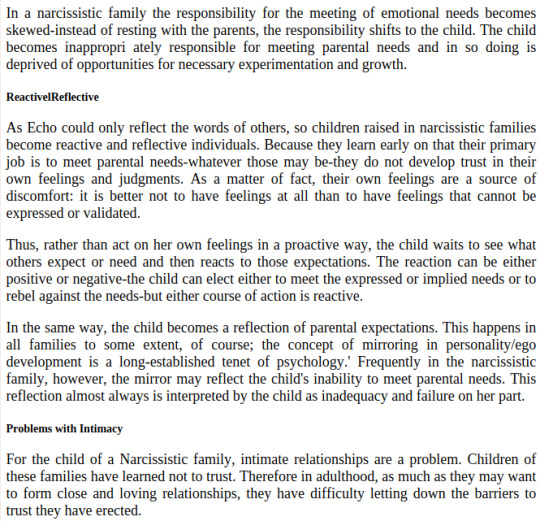
(And this one is in a section about romantic relationships, but I can see this whole thing running through Loki’s subconscious in every scene where he has Thor or Frigga standing in front of him.)
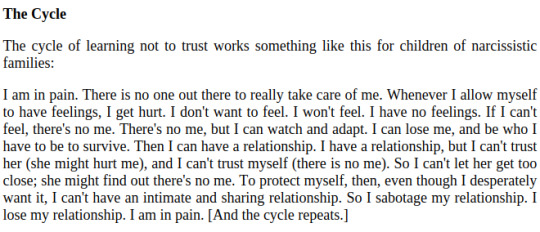
(@lucianalight You have written excellent meta posts about this which opened my eyes in the first place – I had read about this topic years before, but not made the connection to Odin’s family; I hope you don’t mind a tag here?)
<End of quote>
So, I am not completely done reading ‘why does he do that? - inside they mind of angry and controlling men’ by Lundy Bancroft so I raise no claim to completeness. Two short remarks at the beginning: The book describes situations in romantic relationships and is therefore not exactly pointed towards sibling relationships as we see in canon MCU between Loki and Thor. Since I believe abuse to work in many situations similarly, I am still using it to interpret the brothers’ relationship. But this is of course a point that can be discussed.
Second: the book describes situations in which a woman is abused by a man. Therefore, a “he” in the text refers to the abuser and a “she” to the abused. Loki would in this context be labeled “she”, since most signs point towards him being the abused one. The book states very clearly that abuse can happen in same-sex relationships as well and is just as bad and worthy of condemnation as abuse in hetero-relationships. The wording simply eases the reading process because you always know if the author refers to the abuser or the abused.
1. Is Loki really abused?
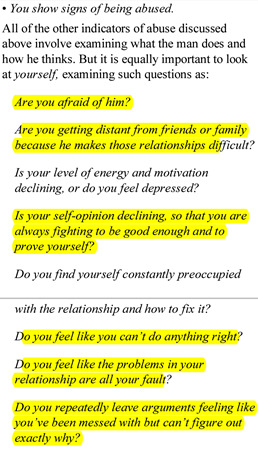
I marked the points yellow which I think might be true in his case. Here some gifs why I think so:
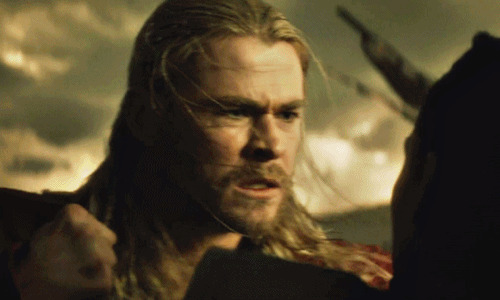
Source of the gif and a nice meta about TDW
The gif is relevant both for “are you afraid of him” and “do you feel like the problems in your relationship are all your fault”.
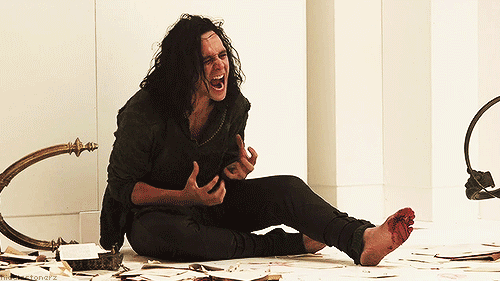
Source
Also, when we see Thor and Loki for the first time in Thor 1, Loki doesn’t appear to have any friends of his own. As to the aspect of isolating him from his family:
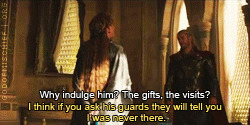
Source
2. Disrespect is the soil in which abuse grows.

I think we know Thor doesn’t respect Loki like he respects other people such as the Avengers and other Aesir.
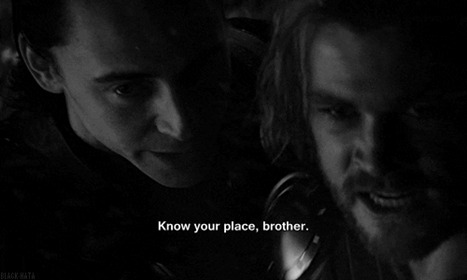
Gif source.
But Thor doesn’t know of Loki’s heritage until the end of Thor 1. So where does this come from?
This whole topic is connected to the first of my introductionary remarks. Abuse in romantic relationships is so common, because there is an imbalance of power in combination with the feeling of being above the other. Due to our social conditioning, the man is mostly more powerful than the woman, and there are far more abused women than abused men. People often argue a woman could abuse a man just as well. The author meets this point that this is true on a surface level, but abuse is mostly based on entitlement. Men, who are raised in a belief of superiority, feel entitled to be catered by their wife and entitled to use force if she refuses or fails to do so.
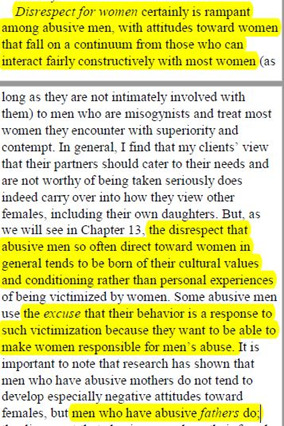
So, we are back at Odin again, who certainly knew about Loki’s heritage and didn’t fail to act upon this knowledge. And not only his dismissive attitude towards Loki carries over to Thor, but also to the staff, as we see in the famous “spilled wine”-scene of Thor 1. So Odin basically taught Thor that he’s better than Loki.

And based on this learned disrespect, Thor feels entitled to enforce the respective behavior in Loki.

Thor shows signs of this power over Loki very early. Loki is the only one of his group he doesn’t ask to accompany him. He just assumes it. And Loki complies. He orders Loki around on Jotunheim, but Loki doesn’t comply this time. We can’t know if Thor would have gotten back to him, because he gets banished before he has the change to. We see Thor quite often demand something from Loki in the following films without Loki obeying. It mostly gets violent after that. But since it still are superhero films we can’t count this as abusive behavior because it’s somehow ‘normal’ in this context. I don’t remember Thor using physical force to make someone else do as he wishes in the films. Interestingly, if he does so it would rather invalidate the theory of him being an abuser, since most abuser make sure only to exhibit this kind of behavior in private, because they don’t want to hurt their public reputation. So if he would threaten people more often, it would rather mean that he’s a brute than an abuser.
Since we already discussed the narcistic personality disorder I would mention that both things can appear in combination:

You might have noticed that I did refrain from using examples from Thor – Ragnarok up to this point. This is intentional. Because most points that indicate Thor would act in an abusive way are relatively rare in the first films (Thor 1, Avengers and The dark world). Thor 1 even sketched out a redemption arc from his arrogance (which is the basis of entitlement) and even though he has his flaws in TDW he isn’t giving in to most of his urges. In the boat scene he threatens to punch Loki, but he doesn’t act on his urge. This is means he does, in fact, NOT feel entitled to do so. He remembers Frigga and recalls he should not. An abuser is different from an angry man because he thinks he has the right to hurt the other one.
This tone changes in Thor - Ragnarok:
I will try to make this as conceive as possible and therefore use a list of methods abusers use in interactions (split into two parts because it was to long for one picture):

Sulking, Refusing to talk: Thor’s behavior in the cell when Loki visits to talk.
Ridicule: He throws stones at Loki in the cell.
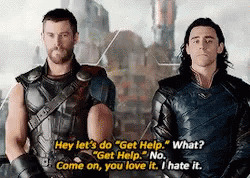
Source
Distorting what happened in an earlier interaction:

Source
(Ok, this one is not sure, since we don’t know what actually happened. But he says first “I dumped her!” and then “It was mutual dumping” which fits the point that past actions get distorted.)
Using a tone of absolute certainty and final authority: In his talk with Hela about her past.

Source
Everything is your fault: Thor demands Loki to lift his magic before Odin’s death. He implies Hela’s return is Loki’s fault. He blames Loki for the situation in the nine realms.
He changes the subject to his grievances: When he talks to Bruce about his fear being on a planet and changes to the point that Bruce has to help him fight Hela.
Part II:
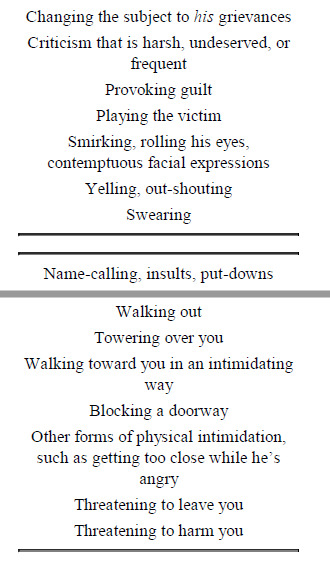
Provoking guilt/Turning your grievances around to use them against you:
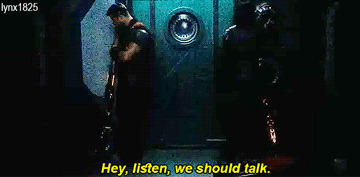
Source
Playing the victim:
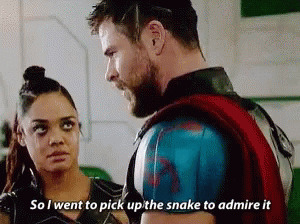
Source
Threatening to leave you:
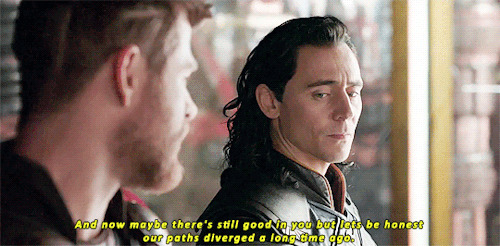
Source
But the major point will always be the physical violence. Here some quotes concerning that:

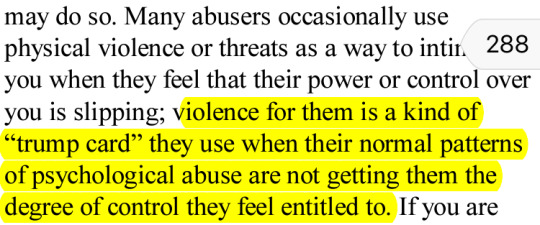



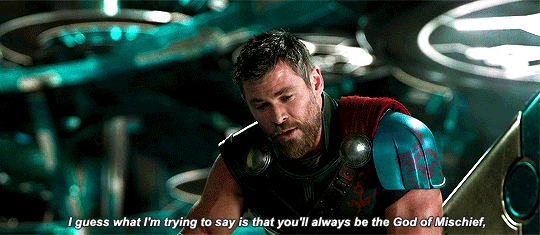
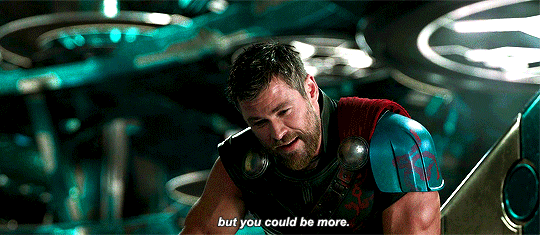
Source
#Anti thor ragnarok#anti chris hemsworth#tw: abuse#mcu salt#anti taika waititi#tw: phyisical violence#mcu loki#tom hiddleston#ragnarok discourse#there is another point i didn't even start on#it is that abusers are very good in turning other people against you#they distort their view on you so they side with the abuser#for example they often turn the positions around claiming they would be the victim#and now we can start talking about Loki's ooc-ness in Thor Ragnarok#and how he suddenly was the bullying kid#But this would be accusing a real person of abuse#and I tried to limit my rambling to the realm of fiction
46 notes
·
View notes
Text
saw thor ragnarok this evening, and i have to say it was “Good, but”, with a pretty significant “but” to that. waititi’s comedy really has some great moments, but the classic marvel plotline makes the tone kind of bounce around a lot? it feels like waititi was able to change the story’s tone and dialogue almost entirely, but the basic outline of the story was out of his control, and there’s some really heavy shit in there, like thor grappling with his father’s death, valkyrie’s traumatic past, banner vs. the hulk (which just gets ignored completely at the end) and skurge’s entire subplot that really doesn’t work with jokes about the devil’s anus just a few minutes apart from it.
The tone problem is worst with Korg, who had me laughing a lot when he was introduced, but he gets used too much, especially towards the end where it actually had me annoyed. There’s also some really weird design elements: thor’s eye being cut out looks surprisingly bad, grandmaster’s tempo is supposed to be casual but it gets old fast, odin acts like a mildly annoyed dad through the whole movie which you can do but don’t have thor angst about his death then? The worst though is the led zeppelin in the climax having horrible audio quality that actually stands out enough that I didn’t enjoy the scene as much as I might’ve otherwise.
but that said, it’s the first superhero movie i’ve enjoyed in ages because the genre has gotten very rote, and thor ragnarok was actually just fun to watch again. There’s a lot of actual fun and levity in the story, even when it’s about pretty heavy topics. There’s great character dynamics even between side characters (valkyrie and hulk/banner being the best, but even loki and banner getting a few bits of dialogue between them is gold), the sarcasm absolutely works with the family dynamics at play, and also the overt criticism of empire and denying uncomfortable history (”Where do you think all this gold came from?”) is a serious plot element that’s interesting and still works with the story without being the all too well worn family death and doomsday. It’s a movie I’d definitely consider rewatching as well, because it’s good! pretty good. Maybe about on the border of great.
p.s.: i’m not doing like, serious literary analysis on ragnarok, it’s just this is how i engage with media, learning to create stories has generally made me focus more on how a story’s told rather than what it’s actually about and reflecting on that is part of how i enjoy something
3 notes
·
View notes
Note
i've been reread your fic "Home (Is Where The Heart Is)" and let me tell you this is probs one of the best fics i've ever read i love the dynamics of all 3 ships in it you did them all so much justice and just ty for that. Your fic also got me thinking about how Xander, Camilla, Beruka, Leo, and Niles would all react to the Awakening-Fates trio's story and how they'd settle into life after the war knowing that they'd be staying there, so I was curious as to if you had any thoughts on this too?
Firstly, thanks so much!!! I liked writing that fic a lot because I’m Dramatic™ and wanted the drama, and I’m glad you think I got the dynamics down in it! I feel like I’ve adjusted my thoughts on the dynamics a little since then too (or at least fleshed them out some) so I hope to write some more of all of those pairings soon! (School’s a bit busy rn, but anyway I’m glad you enjoyed my fic!!! Thank you!)
For the second part of your ask… Hmm. Sorry, but I’m not entirely sure what you mean? Do you mean how the Royals would react to knowing the Trio’s story and the Trio staying in Nohr? Or for the Trio to return to Ylisse while the Royals stay in Nohr? I have some thoughts on both, and I’ll answer kinda generally, but if you send another ask clarifying, I can be more specific too! (Sorry that I don’t understand, OTL)
If you mean the Trio staying in Nohr after the Royals hear their story, I do think that would change dynamics a little bit. I think I talked about it a bit here, but it’d probably hit the Nohrian Royals that the Trio come from really convoluted circumstances and the Trio gave up a lot to be in Nohr, so expecting them to stay is kinda selfish even if they all want to be together. (Not that the Trio wouldn’t stay; just that they come to understand there’s a lot waiting in Ylisse for them too). A lot of their behavior can probably sometimes be explained by their childhood and the Risen/the wars, and they have the ability to be more open in a way they couldn’t be before when hiding their past, so being honest with each other can only bring each group closer, tbh.
(I normally try to stay away from topics that are too dark because that’s just my general disposition, but tbh I do realistically think about the Trio’s trauma/coping in regards to time travel and the war and living in what was essentially an apocalypse for most of their life A Lot, so I expect that really influenced their behavior a lot too. Which I’m sure the Royals + Niles/Beruka would put together too once they know the full story; they’re not dumb)
If you mean the Trio leaving while the Royals + Beruka/Niles stay, that’s a slightly sadder story with potential for a happy end anyway. Again, expecting the Trio to stay, no doubts about it, when do they have a home/friends/family who potentially think they’re all dead now back in another world, a world they were born in and are more familiar with, is… selfish. Kinda. And in canon Fates endings, whoever the Trio marries usually just ends up going back with them to Ylisse, even if they’re Royals, because Xander is the crown prince and they don’t have to worry about it. If Xander marries Selena in-game, it’s kinda vague? But seems to imply he also returns to Ylisse with her after marriage. But, like. 3 out of 4 royal children cannot run off to another world and leave Elise alone to rule, even if she were old enough for it and she wouldn’t be super lonely. And it’d also be kinda unfair for, say, Leo to go while Xander and Camilla stayed and vice versa. Even if one or two of them could follow the Trio to Ylisse, I’m not sure they’d want to out of guilt and fairness to the others. It’d be a long Debate. Probably with a lot of friction and Guilt. (With ultimately all the Royals staying, possibly)
I don’t think Beruka would ever leave Camilla’s side, and same for Niles and Leo. There’s too much loyalty there (especially on Niles’ part when he feels he owes Leo something sometimes). Which isn’t to say there’s no loyalty between Beruka/Selena and Niles/Odin either; duty probably comes first but it still Sucks. Hard. Even when choosing to stay with their beloved Lady/Lord. It’d be rough.
However, I straight up can’t deal with sad endings like this, so the two groups (or even Corrin) would probably stumble across the Dragon’s Gate and use that to travel between worlds to visit each other/vacation all the time. Or the gem/crystal ball/whatever that was that human Anankos gave to the Trio can be used an infinite amount of times. Because I need there to be a happy ending. (However they’d probably be sad about any separation too.)
#my text#asks#fe14#sorry that was kinda vague!#like i said if you send another ask i can clarify a bit more#thanks!
7 notes
·
View notes
Note
Sorry, you've probably answered this before, but uh.. why do you hate Frigga? I'm asking because I never really paid her much attention so, being indifferent towards her, I just wanted to know why you dislike her.
Hoo boy. How much time do you have? I will attempt to be somewhat concise here, but... well, I have a lot of feelings about Frigga and 98% of them are negative.
Frigga is extremely manipulative and it’s actually her intervention in family affairs far more than Odin’s that enables his abusive tendencies, especially when it comes to Loki. Odin is more outwardly abusive; Frigga is sent in to pacify Loki’s anger, to convince him he’s overreacting and bring him back into the fold whenever he threatens to break away. Here is a shortlist of the shitty things we’ve seen Frigga do in the first two Thor movies:
She not only goes along with lying to Loki his entire life but perpetuates the “Jötnar are monsters” narrative, knowing fully well that Loki is one of them. To top it off, when the truth comes out, she at no point tells him there’s nothing wrong with being what he is. She merely brushes it aside as if it doesn’t even matter and emphasizes that he was raised by her and Odin. In other words, he’s not like all those other icky frost giants. He’s the exception.
When the truth comes out, her first priority is to absolve herself of any responsibility for going along with the lie. “I told him to be honest with you from the beginning.” Ok, but you weren’t honest either. Exercise some personal autonomy, Frigga. Maybe there’s some limited merit in the idea that Asgard is patriarchal and she had to go along with whatever Odin decided, but the “she was afraid of Odin” defense quickly falls apart when you realise that she’s throwing Odin under the bus right in front of him. He may not be conscious right now, but according to her, he can hear everything that’s going on around him.
She either ignores or completely misses the fact that Loki is in an extremely precarious mental state and forces upon him the additional burden of ruling a realm that’s suddenly at war—with the very peoples he’s just learned he belongs to, no less. And she does so without providing him with a lick of support or guidance. Whether she thought this was a nice thing to do for him by giving him a chance to prove himself or was prioritizing her own belief that Loki was better suited to the throne is unclear, but either way, it’s at best an idiotic move and at worst an utterly cruel one. Bonus points for the verbal command to “make [his] father proud”. Ugh.
She never asks him, at least so far as we can tell, about what happened to him or why he showed up on Earth acting so completely out of character. Her vision of him (see the prelude comic for The Dark World) appears to even include Thanos and The Other, and yet she never mentions any of this. Neither to him, nor to Thor, nor to Odin.
When he attempts to distract himself with illusions after being imprisoned for the rest of his life, she doesn’t address the substance of his fantasies by assuring him that he doesn’t need to be Thor in order to be worthy of love or adoration. Instead, she criticizes him for trying to escape his present reality, despite the fact that there’s nothing he can do to change it.
She gaslights him with that “a true king admits his faults” crap while hypocritically defending a man who has never admitted to being wrong about anything in his entire life. Loki’s responses to being mistreated by his so-called family are always out of line, even when they’re 100% rational. He does not have the right to grieve or feel betrayed, even though he has been. It is forever on him to forgive and forget, or more accurately to minimize and deny that any wrong was done to begin with.
She attempts to emotionally blackmail him into accepting Odin as his father again by basically insinuating that he can have either both or neither of them as his parents, and then has the audacity to act hurt when he rejects her manipulation.
And these are all just what we see happen onscreen, let alone whatever chicanery she must have gotten up to behind the scenes over the previous millennium. At the end of the day, Frigga had a superficially positive relationship with Loki (she spent more time with him, she taught him magic, she was not outwardly hostile towards him), but that only served to make the ways in which she mistreated him that much more damaging—because he was closest with her, he trusted her, and that trust was taken advantage of and used against him at every turn. Exacerbating my hatred is the fact that 90% of the fandom, at least in my experience, either overlooks or fails to recognise any of this and talks about her as if she’s the greatest mom to ever live. She was not even really a force for good in Loki’s life when you step back and look at the bigger picture—let alone the wise, selfless, adoring mother most people portray her as.
#send me asks#frigga's b+ parenting#loki meta#loki#mcu#topic: odin's family dynamic#topic: loki's mental collapse#Anonymous
266 notes
·
View notes
Note
This thought bugged me at 3am in the morning. This is just the rant my head started.
The first time Thor seriously messed up, Odin gave him a chance to prove himself right away, the first time Loki seriously messed up (even tho the attack on ny wasn't his fault, which is the only crime Odin seemed to care about), Odin locked him away for life without even a chance to explain himself. (Even tho Odin banished Thor, he sent his hammer with him which means he assumed he'd prove himself worthy again without any further punishment) (while Loki didn't even get a chance to explain that the attack on NYC wasn't his fault or even explain anything that happened after his fall from the bifrost)
Tbh, I don't think Loki would have told the truth about what happened to him even if anyone had cared enough to ask. There are a number of reasons for that, but I'll just link to this excellent post by @magicmastered that outlines many of them. But basically, for Loki to tell the truth would be to make himself extremely vulnerable to people who have only ever taken advantage of and manipulated him. It's horrible, but because of the things he's experienced—both before and after Thanos—Loki would rather be seen as a cold-blooded killer than a victim. He would rather be hated than pitied.
The thing I think we need to understand about Odin is that he did not actually banish Thor or imprison Loki for moral reasons. That is just the excuse he uses. He banishes Thor for disobedience and for wounding his pride (it's noteworthy that he doesn't make that decision until right after Thor dismisses him as "an old man and a fool"). He imprisons Loki for embarrassing him (and one could even say outright challenging him, since the Nine Realms are at least ostensibly under his control protection) and, probably even more significantly, failing to show him due deference upon his return. Perhaps the old Loki would have apologised, begged for forgiveness, bent over backwards to make things right and prove his loyalty again. That Loki is long gone now. He not only doesn't grovel; he goes out of his way to make a mockery of the entire situation. He dares to point out Odin's hypocrisy to his face. Odin has lost control of his second son; that much is obvious. And that makes Loki all but useless to him. It's not that Thor's war crimes are redeemable and Loki's aren't; it's that Thor's respect is retrievable and Loki's isn't.
#and this makes sense#and is fairly predictable#due to the nature of the narcissistic family structure#if anyone in the family is going to see the narcissist for who they are and break away from their toxicity#it's most likely to be the scapegoat#tag commentary#send me asks#loki meta#loki#odin's a+ parenting#mcu#topic: odin's family dynamic#topic: why didn't loki tell?
326 notes
·
View notes
Note
Do you think Odin abused Loki as child? Like flogging or beating? And that's why Loki has never gotten his well deserved shirtless scene?
I am, it would seem, the only person in the entire Loki fandom who doesn't think it's a travesty that we haven't seen him topless, so rolling my eyes a bit at that last part. Sorry. Lol
As for the the rest, I don't think there's much evidence that Odin's abuse of Loki was ever physical in nature (uhhh unless you consider literally whitewashing him as an infant physical abuse, I guess, but...). I'm not saying it definitely wasn't or that I in way think Odin would have a moral objection to beating his children; I'm just saying I don't see evidence for it. Thor, on the other hand...
I know Thor being abusive is one of those controversial subjects we're not supposed to acknowledge. The idea makes people uncomfortable; unlike Odin, they want to be able to go on liking Thor. They think, perhaps, that as soon as you utter the A word, that person becomes irredeemable garbage (despite the fact that abuse = action, not intent) or that it erases the fact that Thor was abused himself (albeit differently than Loki). Maybe they think it means I'm putting Odin and Thor on equal footing in terms of morality; I am not. But I'm also not sure what else people expect me to call it. Thor's first instinct with people who anger him (especially with Loki) is to threaten them with physical violence. There's not a single movie in which they share screen time where this isn't the case. And as someone who grew up convinced that my older sister was going to literally kill me someday, I find some of Thor and Loki's interactions very difficult to watch. I find all the "lol, sibling dynamics" jokes about their physical altercations difficult to stomach. So I don't know what else to tell people. Does acknowledging it mean I hate Thor and think he's a monster? No. Does it mean I think he's incapable of changing for the better? Also no. As I've said many times, I believe his mistreatment of Loki (at least pre-TR) stems from ignorance and centuries of habit. Those are things that can be worked on and overcome with enough effort. Odin's abuse of both Loki and Thor, by contrast, is born of, at best, narcissism and at worst, malice. These are things that are less likely to change even if he could be made to see that his actions have been harmful. But that doesn't mean that both aren't examples of abuse, because once again, abuse = action, not intent.
#i've literally seen people say there's no point in the loki series if he doesn't have a shirtless scene#and i'm just over here like '.....'#send me asks#loki meta#thor meta#loki#thor critical#odin's a+ parenting#mcu#topic: thor and loki's broken relationship#topic: odin's family dynamic#tw: abuse
172 notes
·
View notes
Note
Has anyone brought up the possibility that Loki is punished more severely than Odin or Thor for the same crimes *because Loki is Jotun*?
It's not about him being adopted to Odin, it's the perceived failure of taking the Frost Giant from Jotunheim but still being stuck with a useless Frost Giant full of lies and trickery (even if he and Frigga are almost entirely at fault for raising him in this manner).
I don't doubt that Loki being Jötun has a fair amount to do with Odin's disdain for him. But it's not the sole, or in my opinion even the primary, cause for his maltreatment. Odin views everyone around him as extensions of himself, and Loki is a failure in that he is not like Odin. The Phase One: Thor novel makes this quite clear:
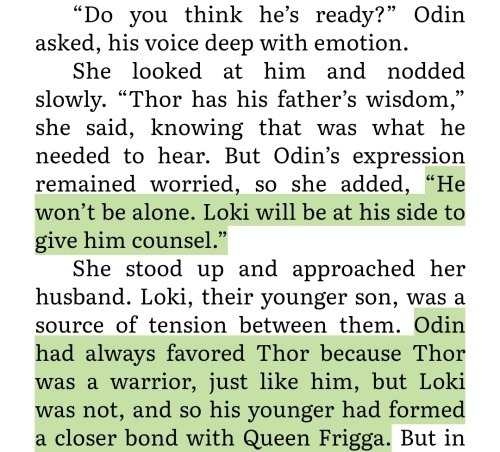
Even Odin knew Thor wasn't ready to be king. Throughout the first few chapters of the novel, he can be seen lamenting Thor's lack of wisdom. As seen above, Frigga attempts to soothe his anxiety by reminding him that Loki will be at Thor's side to do damage control—suggesting that deep down, even Odin may have been aware that Loki was better suited to the throne. But unlike Thor, Loki did not take after Odin in interests or temperament. He was not modelled after Odin, and therefore Odin's vanity demanded forcing the square peg that was Thor into the round hole that was kingship. And to top it off, Odin had other plans for Loki. We don't know precisely what he meant by using Loki to form a permanent alliance with the Jötnar (personally, I believe he intended to install Loki as a puppet king, but that's open to speculation), but we know from his own words that he had a specific scheme in mind. After all of that fell apart and Loki openly gave up on trying to please Odin... well, as I've discussed previously, once it was clear he was no longer under Odin's control, Loki became of no use to him and I believe that’s the most significant factor in why there’s such a disparity in his punishment vs. Thor’s.
#also i kind of love that odin is concerned about thor lacking wisdom#and frigga's first response is to say he has his father's wisdom#she's basically calling odin a fool in a very underhanded way#and i think that's glorious lmao#send me asks#loki meta#loki#thor#odin's a+ parenting#mcu#topic: odin's family dynamic#topic: loki's heritage
80 notes
·
View notes
Note
Recently, I was wondering if Loki had the Stockholm syndrome in relation to the Asgard Royal Family. He was saved (kidnapped) by Odin and belonged to a family who constantly abused him mentally, and in the case of Thor even physically. Loki still felt inferior to this family.
I actually addressed this exact question a couple of months ago. But IMO, based on everything I've read about it, he does not. In short summary, the reasons I say that are because 1) Stockholm Syndrome seems to be more of a coping strategy than an actual illness, so it's not so much something one has as something one does, and 2) Loki lacks the excuse-making that's typically present with Stockholm Syndrome. He feels angry and resentful towards his family (as he should), even as he continues to prioritise their needs over his own. In my estimation, his problem is more one of codependency and a crippling inferiority complex, perhaps combined with the fact that he's just... a ridiculously good person.
61 notes
·
View notes